Sites: news | india | latam | brasil | indonesia
Feeds: news | india | latam | brasil | indonesia
topic: Developing Countries
Social media activity version | Lean version
Stalemate: WTO talks again fail to end overfishing subsidies
- At the World Trade Organization’s 13th ministerial conference (MC13), which closed in Abu Dhabi on March 2, negotiators failed to finalize phase two of an international treaty banning harmful fisheries subsidies.
- Despite 22 years of negotiations, member states remained divided on crucial aspects of the treaty to phase out subsidies worth an estimated $22 billion annually that support overfishing.
- The draft negotiating text includes contentious loopholes, raising concerns about fairness and effectiveness from state delegates, fisheries experts and scientists.
- Ratifications of phase one of the treaty leapt to 71 as 10 more states signed up during MC13, but 39 more are needed for implementation.
Fish deaths near Rio Tinto mine in Madagascar dredge up community grievances
- In March 2022, following the release of wastewater from the Rio-Tinto-owned QMM mine in southeastern Madagascar, thousands of fish turned up dead in neighboring lakes, sparking protests and a government investigation.
- Civil society groups say the mine’s effluent enters neighboring water bodies with alarming regularity, endangering people’s health and robbing them of their livelihoods, and that the mining company is doing little to better the lives of Malagasy people most impacted by its activities.
- The company says it is not responsible for the fish deaths and is providing water and aid to improve relations with local people.
- “If they want to maintain good relations, the first thing to do is not release untreated wastewater into the potable water of villagers,” Tahiry Ratsiambahotra, a Malagasy activist, told Mongabay.
Rio Tinto must repair the damage caused by their Madagascar mine (commentary)
- The giant mining conglomerate Rio Tinto has a large ilmenite mine which abuts wetlands and lies in the vicinity of a river and two lakes in one of the poorest regions of the fifth poorest country in the world, Madagascar.
- Though it’s a large employer in the region, activists say that the company’s Qit Minerals Madagascar mine contaminates water supplies and reduces food security for the vulnerable local population.
- “We [are] calling for the creation of a grievance mechanism which will truly respond to people’s concerns, and that complies with international standards – not only by giving them financial compensation, but by affording them their dignity,” a new op-ed says.
- This post is a commentary. The views expressed are those of the author, not necessarily of Mongabay.
Alleged macaque-smuggling ring exposed as U.S. indicts Cambodian officials
- U.S. federal prosecutors have charged eight people, including two Cambodian forestry officials, for their alleged involvement in an international ring smuggling endangered long-tailed macaques.
- The indictment alleges forestry officials colluded with Hong Kong-based biomedical firm Vanny Bio Research to procure macaques from the wild and create export permits falsely listing them as captive-bred animals.
- One of the officials charged was arrested in New York City on Nov. 16, en route to Panama for an international summit focused on regulating the global trade in wildlife.
- This story was supported by the Pulitzer Center’s Rainforest Investigations Network where Gerald Flynn is a fellow.
WTO ban on ‘harmful’ subsidies won’t impact small-scale fishers, Indonesia says
- Indonesia will continue subsidizing its small-scale fishers in the wake of a recent deal struck by members of the World Trade Organization to end “harmful” subsidies.
- The legally binding agreement prohibits WTO member states from giving subsidies that support the fishing of already-overfished stocks and curbs those that contribute to illegal, unregulated and unreported (IUU) fishing at sea.
- Indonesian subsidies to fishers — in the form of insurance, fishing gear and fuel subsidies, among others — amount to $92 per fisher annually, much less than in the U.S. ($4,956), Japan ($8,385) or Canada ($31,800).
- Indonesia is the second-biggest marine capture producer, after China, harvesting 84.4 million metric tons of seafood in 2018.
WTO finally nets deal curbing fisheries subsidies, but tables key bits for later
- Negotiators agreed on a deal to curb “harmful” government fisheries subsidies that are compromising fish populations and damaging the marine environment.
- The talks among the World Trade Organization’s 164 member states were scheduled for June 12–15, but overtime negotiations didn’t conclude until early June 17.
- The new agreement addresses certain harmful subsidies. But in the interest of reaching consensus, negotiators put off dealing with others where agreement proved elusive.
- Many observers are welcoming the agreement as “historic,” coming as it does two decades after talks began in 2001, even as others point out “major weakness.”
In the DRC’s forests, a tug-of-war between oil and aid
- At the COP26 climate summit, U.K. Prime Minister Boris Johnson and President Féelix Tshisekedi of the Democratic Republic of Congo announced a $500 million aid package to protect forests in the Central African country.
- Part of the Glasgow Leaders’ Declaration on Forests and Land Use, the announcement was one of the top headlines at the summit.
- Now, with the DRC set to auction off oil blocs in carbon-rich peatlands, questions are being raised about whether the package addresses the threat posed by industrial logging and oil drilling.
Does citizen ownership of natural resources hold the key to realizing deforestation commitments? (commentary)
- The approaches to COP26’s global commitment to stop deforestation by 2030 may be inadequate, as they can only partly address the major drivers of deforestation.
- An additional approach based on transparent economic data disclosure and mobilization of public awareness could be a promising addition to that commitment.
- Such approaches that emphasize citizen ownership of natural resources, and which quantify net owner shares, losses, and the very large prospective societal returns, could work, a new op-ed argues.
- This article is a commentary. The views expressed are those of the author, not necessarily of Mongabay.
‘What’s lacking is respect for Mayan culture’: Q&A with Pedro Uc Be on Mexico’s Tren Maya
- The Múuch´ Xíinbal Assembly in Mexico has long led legal battles against attempts to impose a whole range of activities and projects on the Yucatán Peninsula, from genetically modified soybeans and pig farms, to wind farms and solar power plants.
- The start of their legal fight against the railway project known as the Tren Maya, in 2019, opened a new front in their legal proceedings. The Tren Maya is a multibillion-dollar tourist train line that will run 1,525 kilometers (948 miles) across the Yucatán Peninsula.
- As a result of the legal case they have brought against the project, a federal court ruled that a section of the project must be halted while deliberations are made. However, since March, that decision has since been reversed.
- In an interview with Mongabay, Pedro Uc Be, a member of the Múuch´ Xíinbal Assembly of Defenders of the Mayan Territory, explains how the community collective came together to fight against the Tren Maya railway project.
Latest delay casts pall over WTO bid to end harmful fishing subsidies
- International negotiators were set to discuss ending government subsidies that lead to overfishing at the Twelfth WTO Ministerial Conference, scheduled to run Nov. 30 through Dec. 3 in Geneva, Switzerland.
- Days before it was due to start, however, organizers postponed the event indefinitely, due to concerns over the newly announced COVID-19 variant, Omicron.
- Negotiators have been struggling to close the remaining gaps in an agreement that has been 20 years in the works.
- Observers say the ongoing failure to reach agreement on fishing subsidies calls into question the WTO’s ability to adapt to a changing world and meet the U.N.’s Sustainable Development Goals.
Plantation giant Socfin accused of dodging taxes in Africa
- A new report by Bread for all, Alliance Sud, and the German Network for Tax Justice has accused Belgian-French multinational Socfin, which operates rubber and palm oil plantations across West Africa, of shifting profits from Africa to Switzerland.
- According to Socfin’s corporate filings, of 600 million euros in revenues booked in 2020, 100 million euros were said to have been generated in Europe, despite the fact that it does not produce commodities there.
- The use of “transfer pricing” to avoid taxation is common among multinationals operating in Africa, depriving low-income governments of badly needed revenue.
China joins the foreign fleets quietly exploiting Madagascar’s waters
- For decades, fleets of industrial vessels from several nations have fished in Madagascar’s waters.
- Now China appears to have joined the fishing spree, sending at least 14 industrial longliner fishing vessels in the last several years, new evidence shows.
- Clues from official documents indicate that Madagascar’s government may have authorized these vessels to fish, at least since 2019.
- If so, the authorization process was not public, raising renewed concerns about the lack of transparency in Madagascar’s offshore fishing sector.
Billions in fishing subsidies finance social, ecological harm, report finds
- A new report found that the world’s top 10 fishing nations are spending billions of dollars on harmful fishing subsidies to not only exploit their own domestic waters, but to fish in the high seas and the waters of other nations.
- Experts say these subsidies are propping up fishing industries that would not be viable without financial support, and contributing to overcapacity, overfishing, and illegal, unreported and unregulated (IUU) fishing.
- The report also found that harmful fishing subsidies could also be leading to food security issues in some of the world’s least-developed countries where foreign fleets surpass domestic fleets in terms of subsidies and catches.
- The issue of harmful fishing subsidies will be addressed at an upcoming meeting of the World Trade Organization (WTO) that will take place online on July 15.
Myanmar junta’s growing reliance on extractives for cash raises concerns
- Following the military coup on Feb. 1 and a forceful crackdown on protesters, activists are calling on companies that operate in Myanmar to sever links with the military junta.
- As the U.S., U.K., EU and Canada impose increasingly tough sanctions on the junta, future sanctions targeting revenues from the oil and gas sector are likely to have the greatest impact.
- Alongside the humanitarian crisis, advocates say they fear a return to direct military rule could also lead to a backslide in environmental protections.
- Further concerns include a surge in illegal rare earth mining in northern regions and the potential for the military to resume issuing permits for gemstone mining.
As the rest of world tackles plastics disposal, the U.S. resists
- In an expansion of the U.N.’s 1989 Basel Convention, amendments to the international protocol on the shipment of hazardous waste were revised to include plastics in 2021, with nations currently figuring out how to implement the agreement.
- The United States is the only major nation not to have fully implemented the treaty, despite strong support for it among both the Republican and Democratic parties. The Biden administration could soon change that.
- The U.S. remains a major dumper of hazardous waste globally, including large amounts of plastics, despite the attempted limitations imposed by the Basel Convention. The potential impacts of plastics and other “novel entities” on human health and ecosystems are largely unknown.
- Even if the Basel Convention is successful in its mission, it will only solve part of the plastics problem, as it doesn’t address the manufacture of plastics or their domestic disposal. Plastics and a wide variety of human-made materials are included in the “novel entities” planetary boundary — one of nine major threats to life on Earth.
Pet trade relies on ‘disposable’ wild chameleons from Madagascar
- Despite being difficult to keep alive and healthy, chameleons are among the most popular reptiles in the exotic pet trade.
- Each year hundreds of thousands of these slow-moving reptiles are taken from the wild, both legally and illegally, many of them from threatened species living in the forests of Madagascar.
- Observers say the international trade in chameleons must be changed to avoid harming wild populations and improve the well-being of animals during transit and captivity.
- They also point to the need to make the trade fairer and more transparent, so local people can benefit from it.
Risking death and arrest, Madagascar fishers chase dwindling sea cucumbers
- For centuries, Chinese people have sought sea cucumbers as an ingredient in traditional medicine or as a high-status food.
- In recent decades, skyrocketing demand and prices have led to a marine gold rush for sea cucumbers around the world.
- In Madagascar, as elsewhere, wild sea cucumbers are declining.
- Fishers are venturing further out to sea and into deeper waters to pursue them illegally using unsafe SCUBA gear.
Mortgaging the future: Report details risks of resource-backed loans
- A recent report by the Natural Resource Governance Institute finds that billions of dollars in loans backed by the value of a country’s natural resources may be putting these often-developing economies at risk.
- China is a major player in providing such “resource-backed loans,” which can help countries finance critical infrastructure projects.
- But the terms of these loans are frequently unclear, potentially saddling the borrowing countries with untenable debt levels.
- The hasty push to extract resources could also sideline the input of local communities, and it may lead to harming the environment.
Madagascar: Is NGO-led conservation too conservative to conserve much?
- International environmental NGOs working in Madagascar assume a relatively narrow role of supporting local conservation and development in line with government strategy.
- The nature of the NGOs’ legal relationship with the Malagasy government, which has close ties to the extractive industries, and the restrictions that come with international funding make it difficult for them to take a broader role or push for systemic environmental reforms.
- The result, some critics say, is that international NGOs fail to address the country’s most serious conservation challenges.
- Homegrown civil society groups have more room to operate in Madagascar and do some of the most important conservation work.
Madagascar: Opaque foreign fisheries deals leave empty nets at home
- Malagasy fishers blame shrimp trawlers that ply coastal waters for their declining catches.
- However, the bulk of industrial fishing in Madagascar’s waters takes place far from shore and out of view. It’s conducted by foreign fishing fleets working under agreements that critics say lack transparency.
- Conservationists argue that these foreign vessels are also depleting the country’s fish stocks and marine ecosystems.
- With negotiations to renew a fisheries deal with the European Union having flopped late last month and uncertainty lingering over an enormous and controversial fisheries deal with a Chinese company, much is at stake for Madagascar’s small-scale fishers.
In Madagascar, villagers oppose plans for a dam that would inundate their land
- A dam project in Madagascar’s central highlands, still in its planning stages, would submerge several villages, forcing hundreds or thousands of people out of their ancestral homes.
- Residents at risk of being displaced oppose the dam, and civil society groups argue that its potentially large size and social impact are not justified by the relatively small amount of power it would produce.
- The Italian company behind the project insists it’s not yet clear if the project is feasible and has made no definitive plans to build the dam.
Global warming is exacerbating global economic inequality: Study
- New research finds that global warming has exacerbated global economic inequality, making already-wealthy nations even richer while slowing economic growth in poorer countries.
- According to the study, published in PNAS late last month, between 1961 and 2010 rising temperatures led to a 17 to 30 percent decrease in per-capita wealth in the world’s poorest countries. Meanwhile, the wealthy countries that are the world’s biggest greenhouse gas emitters have seen their per-capita GDP grow about 10 percent higher today than they would have in a world without warming.
- Poor countries that, by and large, have not enjoyed the benefits of fossil fuel energy have been made relatively poorer by the energy consumption of wealthy countries — but renewable energy sources might offer a partial solution to both the climate crisis and global inequality.
Illegal corn farming menaces a Madagascar protected area
- Deforestation within Menabe Antimena Protected Area, a large swath of unique dry forest ecosystem on Madagascar’s west coast, has increased dramatically in recent years.
- Slash-and-burn agriculture is the primary driver. Unlike in most places in Madagascar, it isn’t done for subsistence farming but to plant corn, a cash crop traded by a powerful local elite.
- Conservation groups have teamed up to organize raids that have resulted in a number of arrests, and are making inroads into the corn distribution networks.
- So far, however, only impoverished laborers have been held to account, many of them new arrivals to the area who have fled drought in southern Madagascar; none of the well-connected backers of the deforestation have been touched.
Wildlife rangers in DRC park report waning motivation, job satisfaction
- Surveys of more than 60 rangers in Kahuzi-Biega National Park in eastern Democratic Republic of Congo cite poor salaries, few chances for advancement, and security concerns as reasons for their low satisfaction with their jobs.
- The authors of the study, published in the journal Oryx, believe that the rangers’ discontentment leads to waning motivation in protecting the park and its wildlife, which includes the critically endangered Grauer’s gorilla.
- Improved conditions, in the form of better salaries, opportunities for promotion, and better support from the judicial and legal authorities, could translate into improved protections for the park, the researchers write.
Local fishers oppose $2.7 billion deal opening Madagascar to Chinese fishing
- Two months ago, a little-known private Malagasy association signed a 10-year, $2.7 billion fishing deal — the largest in the country’s history — with a group of Chinese companies that plans to send 330 fishing vessels to Madagascar.
- Critics of the deal include the country’s fisheries minister, who said he learned about it in the newspaper; environmental and government watchdog groups; and local fishers, who are already struggling with foreign competition for Madagascar’s dwindling marine stocks.
- Critics say no draft of the deal has been made public and the association that signed it did not conduct an environmental impact assessment or any public consultation.
- The issue has drawn media attention in the run-up to the presidential election on Wednesday. The incumbent and a leading candidate, Hery Rajaonarimampianina, was present at the fisheries deal’s signing, although he later claimed not to be familiar with it.
Top Madagascar shrimp co. moved millions among tax-haven shell companies
- Aziz Ismail, 85, a French citizen born in Madagascar, bought into Madagascar’s shrimp business in 1973. His empire, known generally as Unima, now includes at least eight privately held companies in Europe and Africa that are mainly involved in seafood from Madagascar, where operations are centered.
- Ismail has also owned a British Virgin Islands-based shell company called Ergia Limited since 2000. In the last decade, Ergia appears to have had financial transactions totaling several million dollars with another apparent shell company in Mauritius that has close ties to Unima, and with Unima companies in Europe.
- Although owning and using offshore companies is generally legal, tax and law enforcement officials are increasingly scrutinizing transactions through tax havens like the British Virgin Islands and Mauritius. Tax inspectors from Madagascar and other experts said Unima’s use of multiple offshore companies raises the risk of lost taxes for one of the world’s poorest countries.
- Files obtained from the now-defunct Panama-based law firm Mossack Fonseca as part of the “Panama Papers” were the basis for this investigation by Mongabay and the International Consortium of Investigative Journalists.
Pushing Vietnam’s shrimp industry toward sustainability
- Shrimp farming is one of the biggest industries in Vietnam, and the government is pushing to expand it, having announced plans last year to boost exports from $3 billion in 2016 to $10 billion by 2025.
- But there are significant environmental problems associated with current farming methods, which contribute to deforestation, erosion, land subsidence and rising salinity levels that are threatening the stability of the entire Mekong region.
- The Vietnamese government and a range of international development partners are working to improve the way the country farms shrimp, with an emphasis on small-scale operators.
- However, the reality is that most farmers are reluctant to change.
Angry farmers set fire to offices of Madagascar eco group, gov’t agency
- Large swaths of forest inside northwestern Madagascar’s Bongolava Forest Corridor, a protected area, have been burned to make way for commercial corn farming, raising the fortunes of many residents accustomed to living on the edge of subsistence.
- Last month, angry farmers armed with sticks and machetes stormed into the northwestern city of Boriziny, also known as Port–Bergé, to demand the release of people arrested for illegally clearing farmland inside the protected area.
- The group destroyed the offices of the local nonprofit that manages the protected area and set fire to the building it shares with an outpost of the environment ministry, as well as to the homes of the group’s coordinator and the government administrator for the area.
- The episode highlights the difficulty of achieving meaningful conservation in an area where the populace largely views ecological goals as conflicting with an important source of income.
‘Saving the rainforest 2.0:’ New report makes recommendations for improving forest protection
- Over the past decade, Norway has spent $3 billion to support efforts to keep forests standing in all of the world’s major rainforest countries, helping to elevate forest protection as a globally important cause (and climate solution) in the process.
- But it’s time to take stock of what’s worked and what hasn’t, in terms of both tropical forest protection in general and Norway’s particular role in facilitating forest conservation, and chart a new course forward — that’s the premise of a new report from Rainforest Foundation Norway titled “Saving the rainforest 2.0.”
- The report, released last week as hundreds of policymakers and conservationists met at the Oslo Tropical Forest Forum hosted by Norway, identifies key barriers to stopping the destruction of the world’s forests and offers several recommendations for how the world can more successfully combat deforestation.
‘Annihilation trawling’: Q&A with marine biologist Amanda Vincent
- For years marine biologists have been raising concerns about bottom trawling, a fishing technique that unintentionally scoops up non-targeted creatures as bycatch and disrupts marine habitat.
- While the technique is widely acknowledged to be destructive, seahorse expert Amanda Vincent is calling attention to a new problem: in Asia and elsewhere, bottom trawlers are no longer targeting particular species at all but going after any and all sea life for processing into chicken feed, fishmeal and other low-value products.
- In an interview with Mongabay, Vincent describes her observations in India’s southern state of Tamil Nadu.
Will Madagascar’s industrial shrimp trawlers make way for local fishers?
- Shrimp is one of Madagascar’s most lucrative exports.
- But local fishers and environmental groups say shrimp trawlers are harming the country’s marine environment and leaving too few fish in the sea for the fishing communities that depend on them.
- Until now, relatively little has been done to address the issue.
- But there are small signs that may be starting to change, with fishing communities raising their voices to press for exclusive access to Madagascar’s coastal waters.
Fishing with insecticide-laced mosquito nets is a global phenomenon
- In regions of the world threatened by malaria, bed nets treated with insecticides are an increasingly common public health tool to fend off mosquitos.
- But there is growing evidence that the nets, often provided for free or at a subsidized price by hospitals and aid organizations, are being put to other uses, including fishing.
- A new study is the first to document just how common fishing with mosquito nets may be, finding that people in countries around the world are doing it.
- The practice could have significant environmental and socioeconomic implications.
Mega developments set to transform a tranquil Cambodian bay
- Sim Him has organized the planting of more than 200,000 mangrove trees in Cambodia’s Trapeang Sangke estuary. The surrounding ecosystem, which feeds thousands of families, is thriving.
- But the nearby construction of a ferry terminal and a luxury resort are upsetting the estuary’s equilibrium, and development projects continue west along the coastline from there.
- Dotted along a 25-kilometer (15.5-mile) coastal strip, no less than six large-scale developments present a direct threat to healthy mangrove forests and the fishing communities they support.
- Aside from being a nursery for sealife and a barrier to erosion, mangroves are also one of the planet’s most effective carbon neutralizers, capable of capturing and storing it for millennia.
Abandoned by their sponsors, Madagascar’s orphaned parks struggle on
- A dozen protected areas that were created amid the rapid buildup of Madagascar’s conservation sector in the aughts were later abandoned by their NGO sponsors after the political crisis of 2009.
- Among these so-called orphan protected areas is the 606-square-kilometer (234-square-mile) Bongolava Forest Corridor in the country’s northwest. The U.S.-based NGO Conservation International spent 15 years spearheading Bongolava’s creation, then abandoned the project in 2012.
- A year ago, a scrappy group of locals returned to Bongolava to resuscitate the protected area. Working with a slim budget, they are confronting both intense pressure for farmland inside the protected area and widespread corruption.
- This is the eighth story in Mongabay’s multi-part series “Conservation in Madagascar.”
Carbon dreams: Can REDD+ save a Yosemite-size forest in Madagascar?
- When Makira Natural Park launched in 2005, it seemed to present a solution to one of the most intractable problems in conservation: finding a source of funding that could be counted on year after year.
- The sale of carbon offset credits would fund the park itself as well as development projects aimed at helping nearby communities improve their standard of living and curtail deforestation.
- But more than a decade later, carbon buyers are scarce and much of the funding for community development has been held up. And although deforestation has slowed considerably in and around Makira, it is falling well short of deforestation targets set at the outset of the project.
- This is the seventh story in Mongabay’s multi-part series “Conservation in Madagascar.”
Fish vs. forests? Madagascar’s marine conservation boom
- Inspired by early successes in marine conservation, locally controlled fisheries projects have expanded quickly along Madagascar’s 3,000-mile-long coastline over the past 15 years.
- Now that growth is poised to skyrocket, with rising interest in fisheries management and conservation from international donors, including a planned injection of more than $70 million by the World Bank.
- But the scale of funding for marine conservation has prompted concerns from both small NGOs that already work on fisheries and advocates of terrestrial conservation, who point to the uneven track record of locally controlled fisheries projects around the country.
- This is the fifth story in Mongabay’s multi-part series “Conservation in Madagascar.”
Building conservation’s brain trust in Madagascar
- Foreigners have dominated scientific research in Madagascar, with more than 9 out of 10 publications on biodiversity led by foreigners from 1960 to 2015.
- A series of programs aimed at boosting early career Malagasy scientists is now bearing fruit as local researchers take on leadership roles in conservation.
- But Madagascar’s higher education system remains weak and deeply under-funded, so that the best chance of rigorous training and support for graduate work often comes through connections overseas.
- This is the fourth story in Mongabay’s multi-part series “Conservation in Madagascar.”
Singapore statement on International Day of the Tropics: infrastructure deficit must be met sustainably (commentary)
- The majority of the world’s poorest and most vulnerable communities are in the Tropics, and will be most affected by environmental challenges like climate change.
- The landmark report State of the Tropics in 2014 outlined the full range of these challenges.
- As the world celebrates the second UN International Day of the Tropics on June 29, 2017, a new report on one of the great needs, Sustainable Infrastructure in the Tropics, is launched in Singapore.
- This post is a commentary. The views expressed are those of the author, not necessarily Mongabay.
Police clash with protesters marching against power plant in Bangladesh
- The protesters were showing their disapproval of a new coal-fired power plant currently under construction.
- Injuries were reported, with estimates varying from five to 50.
- Critics of the project say it poses threats to the nearby Sundarbans mangrove – the largest mangrove forest in the world – as well as to the health of thousands of local residents.
- The Bangladeshi government is supporting the project and insists it poses no danger.
Climate change publications biased towards ‘richer, cooler and less vulnerable countries’
- Scientific knowledge generated about climate change is geographically imbalanced and biased, according study.
- Researchers found that developed countries, as well as India and China, produce most of the scientific knowledge on climate change, while developing countries in hotter parts of the world, where climate change effects are expected to be some of the highest, produce very little.
- The study also found that climate change research that does focus on developing countries, is dominated by authors based in developed countries, and often lacks locally-based authors.
How to solve the global fish crisis? Ban fishing on the high seas
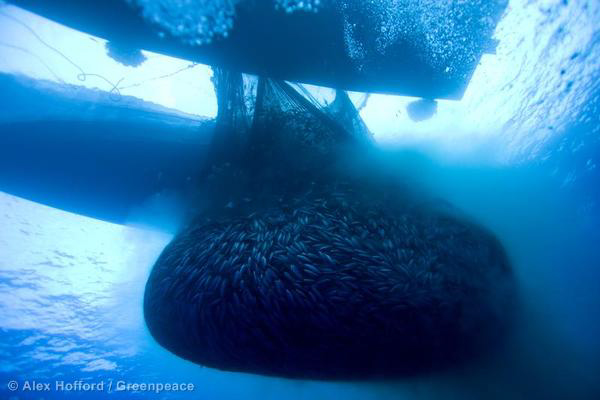 With demand for seafood increasing and numerous fish species declining due to overfishing and other threats, scientists are proposing a seemingly drastic solution: close the high seas to fishing and turn it into “a fish bank for the world.” Don’t worry, they say, doing so won’t affect the fishing industry’s economic returns, and will ensure […]
With demand for seafood increasing and numerous fish species declining due to overfishing and other threats, scientists are proposing a seemingly drastic solution: close the high seas to fishing and turn it into “a fish bank for the world.” Don’t worry, they say, doing so won’t affect the fishing industry’s economic returns, and will ensure […]
Fisheries in developing countries stall on the path to sustainability
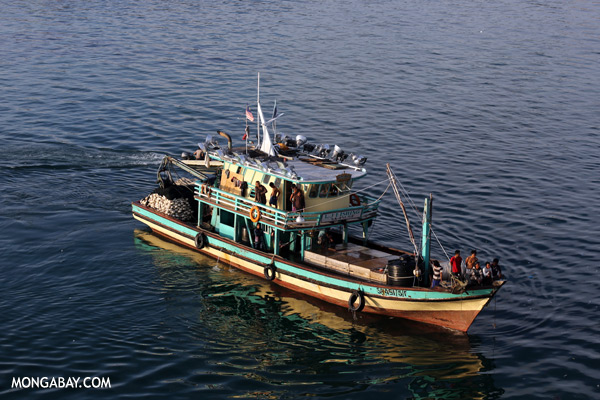 A fishing boat off the coast of the Malaysian state of Sabah. Photo by: Rhett Butler. Consumers in the developed world want sustainably sourced seafood and increasingly retailers like Walmart in the U.S. and Sainsbury’s in the U.K. are promising it to them. But there just isn’t enough certified-sustainable seafood to meet demand. Enter fishery […]
A fishing boat off the coast of the Malaysian state of Sabah. Photo by: Rhett Butler. Consumers in the developed world want sustainably sourced seafood and increasingly retailers like Walmart in the U.S. and Sainsbury’s in the U.K. are promising it to them. But there just isn’t enough certified-sustainable seafood to meet demand. Enter fishery […]
Did palm oil expansion play a role in the Ebola crisis?
 Straw-colored fruit bat (Eidolon helvum) at the Zoological Garden Berlin, Germany. This species, along with other fruit bats, is present in the Ebola impacted area and may have been a carrier. Photo by: Fritz Geller-Grimm/Creative Commons 2.5. The Ebola outbreak in West Africa may have been the result of complex economic and agricultural policies developed […]
Straw-colored fruit bat (Eidolon helvum) at the Zoological Garden Berlin, Germany. This species, along with other fruit bats, is present in the Ebola impacted area and may have been a carrier. Photo by: Fritz Geller-Grimm/Creative Commons 2.5. The Ebola outbreak in West Africa may have been the result of complex economic and agricultural policies developed […]
Booming populations, rising economies, threatened biodiversity: the tropics will never be the same
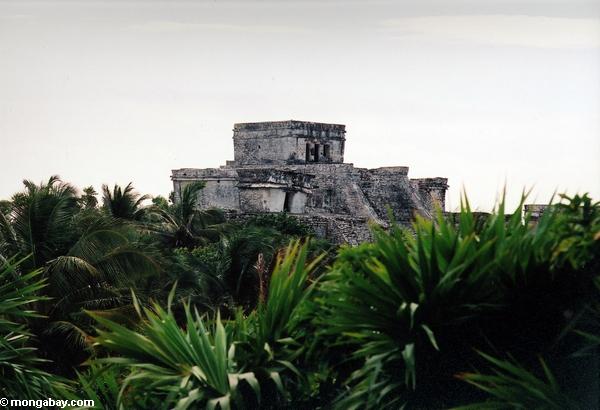 For those living either north or south of the tropics, images of this green ring around the Earth’s equator often include verdant rainforests, exotic animals, and unchanging weather; but they may also be of entrenched poverty, unstable governments, and appalling environmental destruction. A massive new report, The State of the Tropics, however, finds that the […]
For those living either north or south of the tropics, images of this green ring around the Earth’s equator often include verdant rainforests, exotic animals, and unchanging weather; but they may also be of entrenched poverty, unstable governments, and appalling environmental destruction. A massive new report, The State of the Tropics, however, finds that the […]
China pledges $10 million to combat poaching in Africa
 The Chinese Premier, Li Keqiang, has pledged $10 million [see note below] to combat poaching in Africa during a visit to the African Union headquarters in Addis Ababa. The fund is a part of a much larger loan package for the continent from China, totaling $10 billion in credit and $2 billion in aid. The […]
The Chinese Premier, Li Keqiang, has pledged $10 million [see note below] to combat poaching in Africa during a visit to the African Union headquarters in Addis Ababa. The fund is a part of a much larger loan package for the continent from China, totaling $10 billion in credit and $2 billion in aid. The […]
The lemur end-game: scientists propose ambitious plan to save the world’s most imperiled mammal family
 Verreaux’s Sifaka (Propithecus verreauxi), listed as Vulnerable, in a heated chase. Photo by: Rhett A. Butler. Due to the wonderful idiosyncrasies of evolution, there is one country on Earth that houses 20 percent of the world’s primates. More astounding still, every single one of these primates—an entire distinct family in fact—are found no-where else. The […]
Verreaux’s Sifaka (Propithecus verreauxi), listed as Vulnerable, in a heated chase. Photo by: Rhett A. Butler. Due to the wonderful idiosyncrasies of evolution, there is one country on Earth that houses 20 percent of the world’s primates. More astounding still, every single one of these primates—an entire distinct family in fact—are found no-where else. The […]
Richest countries spent $74 billion on fossil fuel subsidies in 2011, eclipsing climate finance by seven times
.600.jpg) In 2011, the top 11 richest carbon emitters spent an estimated $74 billion on fossil fuel subsidies, or seven times the amount spent on fast-track climate financing to developing nations, according to a recent report by the Overseas Development Institute. Worldwide, nations spent over half a trillion dollars on fossil fuel subsidies in 2011 according […]
In 2011, the top 11 richest carbon emitters spent an estimated $74 billion on fossil fuel subsidies, or seven times the amount spent on fast-track climate financing to developing nations, according to a recent report by the Overseas Development Institute. Worldwide, nations spent over half a trillion dollars on fossil fuel subsidies in 2011 according […]
Colombian mining dispute highlights legislative disarray
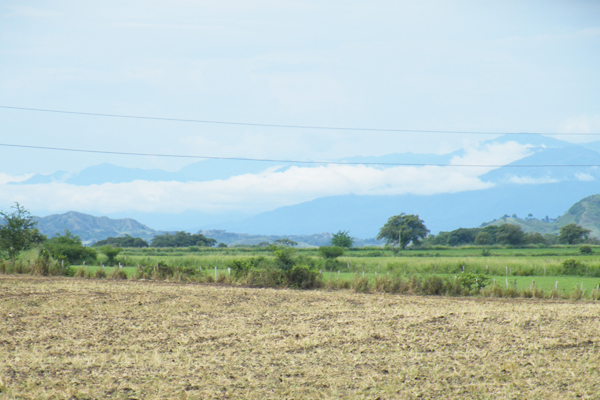 Colombia rules against multinational corporation that demanded disciplining of environment officials. Colombian authorities have ruled that local environmental officials acted correctly in ordering South African mining giant AngloGold Ashanti to halt their work, following demands from the multinational corporation for their disciplining. Cortolima, the environmental authority of the department of Tolima in central Colombia, stopped […]
Colombia rules against multinational corporation that demanded disciplining of environment officials. Colombian authorities have ruled that local environmental officials acted correctly in ordering South African mining giant AngloGold Ashanti to halt their work, following demands from the multinational corporation for their disciplining. Cortolima, the environmental authority of the department of Tolima in central Colombia, stopped […]
NGO: conflict of interests behind Peruvian highway proposal in the Amazon
 As Peru’s legislature debates the merits of building the Purús highway through the Amazon rainforest, a new report by Global Witness alleges that the project has been aggressively pushed by those with a financial stake in opening up the remote area to logging and mining. Roads built in the Amazon lead to spikes in deforestation, […]
As Peru’s legislature debates the merits of building the Purús highway through the Amazon rainforest, a new report by Global Witness alleges that the project has been aggressively pushed by those with a financial stake in opening up the remote area to logging and mining. Roads built in the Amazon lead to spikes in deforestation, […]
The river of plenty: uncovering the secrets of the amazing Mekong
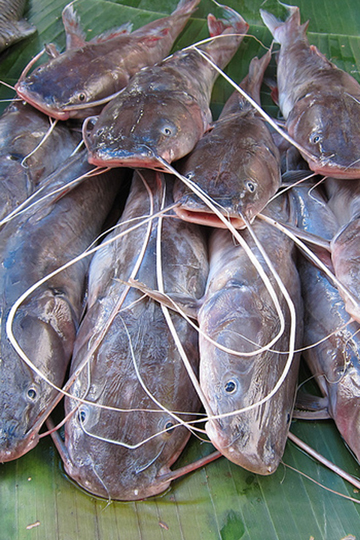 Home to giant catfish and stingrays, feeding over 60 million people, and with the largest abundance of freshwater fish in the world, the Mekong River, and its numerous tributaries, brings food, culture, and life to much of Southeast Asia. Despite this, little is known about the biodiversity and ecosystems of the Mekong, which is second […]
Home to giant catfish and stingrays, feeding over 60 million people, and with the largest abundance of freshwater fish in the world, the Mekong River, and its numerous tributaries, brings food, culture, and life to much of Southeast Asia. Despite this, little is known about the biodiversity and ecosystems of the Mekong, which is second […]
Yangtze porpoise down to 1,000 animals as world’s most degraded river may soon claim another extinction
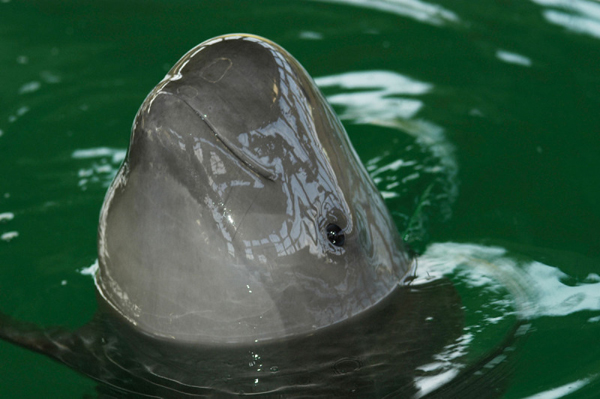 A survey late last year found that the Yangtze finless porpoise (Neophocaena asiaeorientalis asiaeorientalis) population has been cut in half in just six years. During a 44-day survey, experts estimated 1,000 river porpoises inhabited the river and adjoining lakes, down from around 2,000 in 2006. The ecology of China’s Yangtze River has been decimated the […]
A survey late last year found that the Yangtze finless porpoise (Neophocaena asiaeorientalis asiaeorientalis) population has been cut in half in just six years. During a 44-day survey, experts estimated 1,000 river porpoises inhabited the river and adjoining lakes, down from around 2,000 in 2006. The ecology of China’s Yangtze River has been decimated the […]
Proposed coal plant threatens Critically Endangered Philippine cockatoo
 One kilometer off the Philippine island of Palawan lies the Rasa Island Wildlife Sanctuary; here forest grows unimpeded from a coral island surrounded by mangroves and coral reefs. Although tiny, over a hundred bird species have been recorded on the island along with a major population of large flying foxes, while in the waters below […]
One kilometer off the Philippine island of Palawan lies the Rasa Island Wildlife Sanctuary; here forest grows unimpeded from a coral island surrounded by mangroves and coral reefs. Although tiny, over a hundred bird species have been recorded on the island along with a major population of large flying foxes, while in the waters below […]
Indigenous protester killed by masked assailants in Panama over UN-condemned dam
 Barro Blanco hydroelectric dam under construction. Photo courtesy of Robin Oisín Llewellyn. A Ngäbe indigenous Panamanian, Onesimo Rodriguez, opposing the Barro Blanco hydroelectric dam project was killed last Friday evening by four masked men. His body was then thrown into a nearby stream where it was discovered the following day. Onesimo Rodriguez was attacked with […]
Barro Blanco hydroelectric dam under construction. Photo courtesy of Robin Oisín Llewellyn. A Ngäbe indigenous Panamanian, Onesimo Rodriguez, opposing the Barro Blanco hydroelectric dam project was killed last Friday evening by four masked men. His body was then thrown into a nearby stream where it was discovered the following day. Onesimo Rodriguez was attacked with […]
Planet organic: achieving sustainable food security and environmental gains
 Organic vegetables for sale in Argentina. Photo by: René Piamonte. The global farmland area certified organic has expanded more than threefold to 37 million hectares since 1999, according to new research conducted by the Worldwatch Institute. The Institute argues that organic farming has the potential to contribute to sustainable food security by improving nutrition intake […]
Organic vegetables for sale in Argentina. Photo by: René Piamonte. The global farmland area certified organic has expanded more than threefold to 37 million hectares since 1999, according to new research conducted by the Worldwatch Institute. The Institute argues that organic farming has the potential to contribute to sustainable food security by improving nutrition intake […]
Burning coal may be killing over 100,000 people in India every year
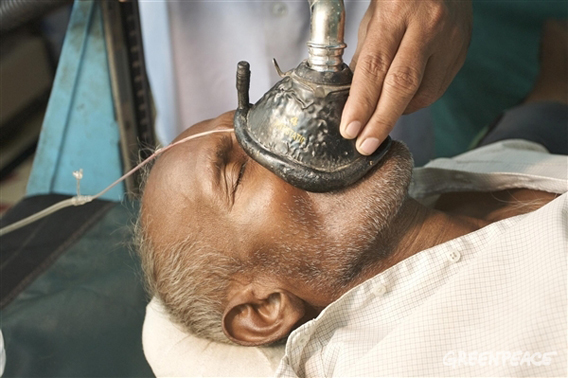 Bhagwat Saw, 69, in hospital after he was diagnosed with pneumoconiosis. He has been working as a coal loader for over 40 years. © Peter Caton / Greenpeace. India’s dependence on coal-fired power plants for energy may be leading directly to the deaths of 80,000 to 115,000 of its citizens every year, according to the […]
Bhagwat Saw, 69, in hospital after he was diagnosed with pneumoconiosis. He has been working as a coal loader for over 40 years. © Peter Caton / Greenpeace. India’s dependence on coal-fired power plants for energy may be leading directly to the deaths of 80,000 to 115,000 of its citizens every year, according to the […]
Featured video: moving green, local energy forward in Southeast Asia
 Rainforest in Sabah, Malaysia on the island of Borneo. Photo by: Rhett A. Butler. A new video highlights the work and drive of renewable energy proponents at the inaugural meeting of Southeast Asia Renewable Energy People’s Assembly (SEAREPA) in the Malaysian state of Sabah. Held last year, the meeting brought together 80 organizations from 12 […]
Rainforest in Sabah, Malaysia on the island of Borneo. Photo by: Rhett A. Butler. A new video highlights the work and drive of renewable energy proponents at the inaugural meeting of Southeast Asia Renewable Energy People’s Assembly (SEAREPA) in the Malaysian state of Sabah. Held last year, the meeting brought together 80 organizations from 12 […]
Investors beware: global land grabbing ends in ‘financial damage’ and human rights violations
 A fence keeps locals from their traditional lands in Liberia, where Sime Darby has planted a contested palm oil plantation. Photo courtesy of the Rights and Resources Initiative (RRI). Investing in companies that flout local community rights in developing countries often leads to severe economic losses, according to a new report from the Rights and […]
A fence keeps locals from their traditional lands in Liberia, where Sime Darby has planted a contested palm oil plantation. Photo courtesy of the Rights and Resources Initiative (RRI). Investing in companies that flout local community rights in developing countries often leads to severe economic losses, according to a new report from the Rights and […]
Photos reveal destruction of Cameroon rainforest for palm oil
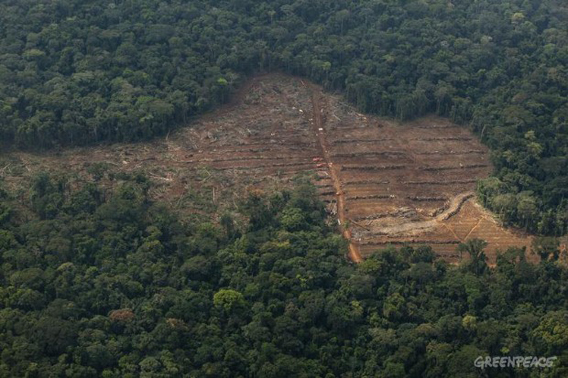 Clearing of trees in a concession area of Herakles Farm’s area for a palm oil plantation. Greenpeace says these clearings are illegal since Herakles’ lease has not been given final approval. Herakles Farm did not respond to request for comment. Photo: © Greenpeace/Alex Yallop. Newly released photos by Greenpeace show the dramatic destruction of tropical […]
Clearing of trees in a concession area of Herakles Farm’s area for a palm oil plantation. Greenpeace says these clearings are illegal since Herakles’ lease has not been given final approval. Herakles Farm did not respond to request for comment. Photo: © Greenpeace/Alex Yallop. Newly released photos by Greenpeace show the dramatic destruction of tropical […]
Wolves, mole rats, and nyala: the struggle to conserve Ethiopia’s highlands
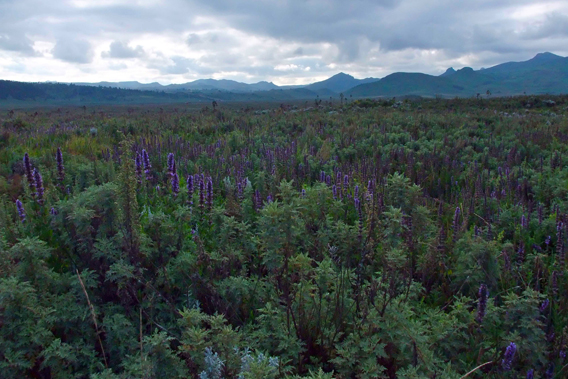 Gaysay Grasslands in Bale Mountains National Park. Photo courtesy of the Frankfurt Zoological Society (FZS). There is a place in the world where wolves live almost entirely off mountain rodents, lions dwell in forests, and freshwater rolls downstream to 12 million people, but the place—Ethiopia’s Bale Mountains National Park—remains imperiled by a lack of legal […]
Gaysay Grasslands in Bale Mountains National Park. Photo courtesy of the Frankfurt Zoological Society (FZS). There is a place in the world where wolves live almost entirely off mountain rodents, lions dwell in forests, and freshwater rolls downstream to 12 million people, but the place—Ethiopia’s Bale Mountains National Park—remains imperiled by a lack of legal […]
Tanzania weighs new soda ash plant in prime flamingo territory
 Lesser flamingoes in Kenya. One third of the world’s lesser flamingoes nest in Tanzania’s Lake Natron. Photo by: Steve Garvie. In a choice between flamingoes and a soda ash plant, a new report shows that local residents near Lake Natron, Tanzania prefer flamingoes. This is good news for conservationists as the area is the most […]
Lesser flamingoes in Kenya. One third of the world’s lesser flamingoes nest in Tanzania’s Lake Natron. Photo by: Steve Garvie. In a choice between flamingoes and a soda ash plant, a new report shows that local residents near Lake Natron, Tanzania prefer flamingoes. This is good news for conservationists as the area is the most […]
Development halted in crucial wildlife corridor in Malaysia
 Kenyir Wildlife Corridor in northeast Malaysia is teeming with wildlife: elephants, gibbons, tigers, tapirs, and even black panthers (melanistic leopards) have been recorded in the 60 kilometer (37 mile) stretch of forest. In fact, researchers have recorded over 40 mammal species (see species list below), including 15 threatened with extinction according to the IUCN Red […]
Kenyir Wildlife Corridor in northeast Malaysia is teeming with wildlife: elephants, gibbons, tigers, tapirs, and even black panthers (melanistic leopards) have been recorded in the 60 kilometer (37 mile) stretch of forest. In fact, researchers have recorded over 40 mammal species (see species list below), including 15 threatened with extinction according to the IUCN Red […]
Controversial dam gets approval in Laos
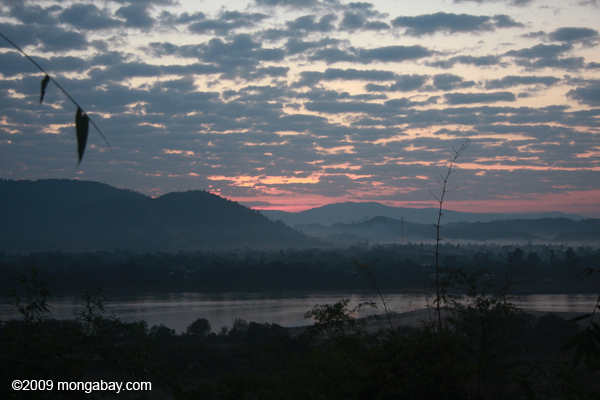 The Mekong River in Thailand. Photo by: Rhett A. Butler. Laos has given approval to the hugely-controversial $3.5 billion Xayaburi Dam on the Mekong River, reports the BBC. The massive dam, which would provide 95 percent of its energy production to Thailand, has been criticized for anticipated impacts on the river’s fish populations, on which […]
The Mekong River in Thailand. Photo by: Rhett A. Butler. Laos has given approval to the hugely-controversial $3.5 billion Xayaburi Dam on the Mekong River, reports the BBC. The massive dam, which would provide 95 percent of its energy production to Thailand, has been criticized for anticipated impacts on the river’s fish populations, on which […]
Micro-hydro and decentralized green energy goals set in Borneo
 Participants from diverse backgrounds and groups marking on a map the creation of partnerships through identified projects at the end of the Southeast Asia Renewable Energy People’s Assembly (SEAREPA) at the Rainforest Discovery Centre in Sandakan, Sabah. Photo by: Suzanne Chong/LEAP. The first ever meeting of the Southeast Asia Renewable Energy People’s Assembly (SEAREPA) ended […]
Participants from diverse backgrounds and groups marking on a map the creation of partnerships through identified projects at the end of the Southeast Asia Renewable Energy People’s Assembly (SEAREPA) at the Rainforest Discovery Centre in Sandakan, Sabah. Photo by: Suzanne Chong/LEAP. The first ever meeting of the Southeast Asia Renewable Energy People’s Assembly (SEAREPA) ended […]
After defeating coal plant, Borneo hosts renewable energy meeting
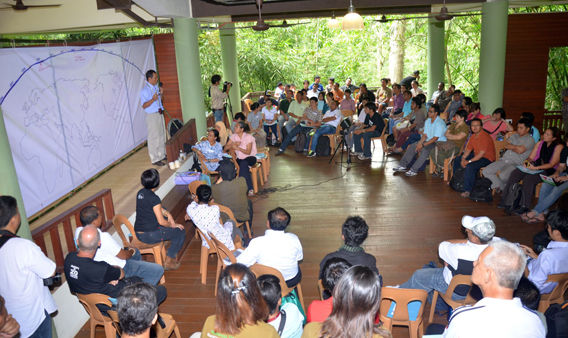 A participant sharing a story at the inaugural Southeast Asia Renewable Energy People’s Assembly (SEAREPA) at the Rainforest Discovery Centre in Sandakan, Sabah. Photo courtesy of SEAREPA. Last year, a coalition of environmentalists and locals won a David-versus-Goliath battle against a massive coal plant in the Malaysian state of Sabah on Borneo. After facing a […]
A participant sharing a story at the inaugural Southeast Asia Renewable Energy People’s Assembly (SEAREPA) at the Rainforest Discovery Centre in Sandakan, Sabah. Photo courtesy of SEAREPA. Last year, a coalition of environmentalists and locals won a David-versus-Goliath battle against a massive coal plant in the Malaysian state of Sabah on Borneo. After facing a […]
Indigenous groups re-occupy Belo Monte dam in the Amazon
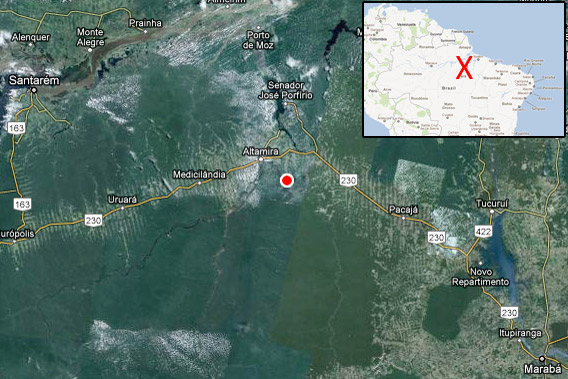 Belo Monte location. Courtesy of Google Earth. Construction on Brazil’s megadam, Belo Monte, has been halted again as around 150 demonstrators, most of them from nearby indigenous tribes, have occupied the main construction site at Pimental. Over a hundred indigenous people joined local fishermen who had been protesting the dam for 24 days straight. Indigenous […]
Belo Monte location. Courtesy of Google Earth. Construction on Brazil’s megadam, Belo Monte, has been halted again as around 150 demonstrators, most of them from nearby indigenous tribes, have occupied the main construction site at Pimental. Over a hundred indigenous people joined local fishermen who had been protesting the dam for 24 days straight. Indigenous […]
World Bank agrees to fund project related to controversial Gibe III dam
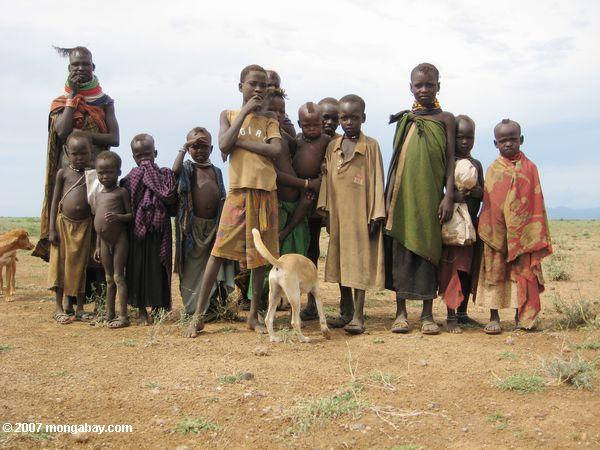 The Turkana people fear their ecosystem will be gravely impacted by the Gibe III dam on the Omo River. Photo by: Rhett A. Butler. Originally refusing to provide funding to Ethiopia’s controversial Gibe III hydroelectric dam, the World Bank has now announced plans to fund the power lines that will carry generated electricity away from […]
The Turkana people fear their ecosystem will be gravely impacted by the Gibe III dam on the Omo River. Photo by: Rhett A. Butler. Originally refusing to provide funding to Ethiopia’s controversial Gibe III hydroelectric dam, the World Bank has now announced plans to fund the power lines that will carry generated electricity away from […]
Conflict and perseverance: rehabilitating a forgotten park in the Congo
 The Democratic Republic of Congo (DRC)’s last herd of zebra run free in Upemba. Photo courtesy of the FZS. Zebra racing across the yellow-green savannah is an iconic image for Africa, but imagine you’re seeing this not in Kenya or South Africa, but in the Democratic Republic of Congo (DRC). Welcome to Upemba National Park: […]
The Democratic Republic of Congo (DRC)’s last herd of zebra run free in Upemba. Photo courtesy of the FZS. Zebra racing across the yellow-green savannah is an iconic image for Africa, but imagine you’re seeing this not in Kenya or South Africa, but in the Democratic Republic of Congo (DRC). Welcome to Upemba National Park: […]
Mekong dam spree could create regional food crisis
 A fisherman on the Mekong River in Laos. Photo by: Rhett A. Butler. Fish are a hugely important protein source for many people around the world. This is no more evident than along the lower Mekong River delta where an estimated 48 million people depend directly on the river for food and livelihoods. But now […]
A fisherman on the Mekong River in Laos. Photo by: Rhett A. Butler. Fish are a hugely important protein source for many people around the world. This is no more evident than along the lower Mekong River delta where an estimated 48 million people depend directly on the river for food and livelihoods. But now […]
Recommendations to save India’s Western Ghats creates political stir
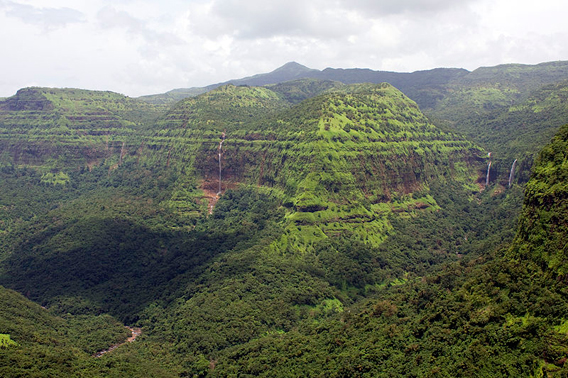 View from Varandha Pass in the Western Ghats. A massive expert panel report on the conservation of the Western Ghats has caused a political stir in India. The report, headed by noted ecologist Madhav Gadgil, recommends that the government phase out mining projects, cancel damaging hydroelectric projects, and move toward organic agriculture in ecologically-sensitive sections […]
View from Varandha Pass in the Western Ghats. A massive expert panel report on the conservation of the Western Ghats has caused a political stir in India. The report, headed by noted ecologist Madhav Gadgil, recommends that the government phase out mining projects, cancel damaging hydroelectric projects, and move toward organic agriculture in ecologically-sensitive sections […]
Elephant ancestors and Africa’s Bigfoot: new initiative works to preserve a continent’s wildest tales
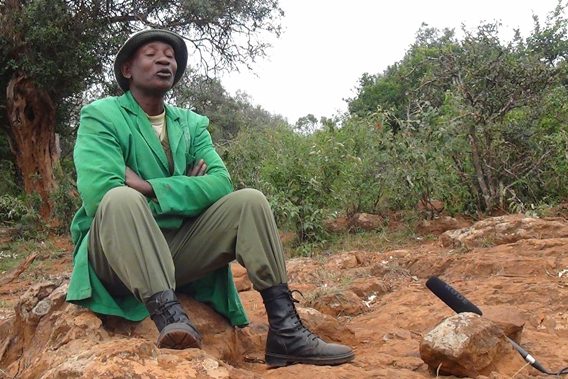 Africa’s Wildest Stories is a new initiative in Kenya to capture personal stories about the relationship of people to nature. Elephant Keeper Mishak Nzimbi (above) has been working at the David Sheldrick center since he was a teenager. It’s a job he would never give up for anything. He is an ordinary man living an […]
Africa’s Wildest Stories is a new initiative in Kenya to capture personal stories about the relationship of people to nature. Elephant Keeper Mishak Nzimbi (above) has been working at the David Sheldrick center since he was a teenager. It’s a job he would never give up for anything. He is an ordinary man living an […]
Evidence of ‘isolated’ indigenous people found in Peru where priest is pushing highway
 View Larger Map Evidence of indigenous people living in “voluntary isolation” in a remote part of the Amazon has been found where an Italian Catholic priest is campaigning for Peru’s government to build a highway. The discovery is controversial because the priest has questioned the existence of the isolated people, sometimes referred to as uncontacted, […]
View Larger Map Evidence of indigenous people living in “voluntary isolation” in a remote part of the Amazon has been found where an Italian Catholic priest is campaigning for Peru’s government to build a highway. The discovery is controversial because the priest has questioned the existence of the isolated people, sometimes referred to as uncontacted, […]
Soccer lights up kids’ lives: new technology produces cheap, portable power
.568.jpg) SOCCKET: the soccer ball that produces electricity. Photo courtesy of Uncharted Play. Recently, Jessica O. Matthews and Julia Silverman, both Harvard graduates, were awarded Harvard Foundation’s Scientists of the Year award for their invention of a soccer ball that converts kinetic energy to electricity. The two women, who were both social science majors, came up […]
SOCCKET: the soccer ball that produces electricity. Photo courtesy of Uncharted Play. Recently, Jessica O. Matthews and Julia Silverman, both Harvard graduates, were awarded Harvard Foundation’s Scientists of the Year award for their invention of a soccer ball that converts kinetic energy to electricity. The two women, who were both social science majors, came up […]
Wealthy consumption threatens species in developing countries
 Deforestation of tropical forests for oil palm plantations in Sabah, Malaysia. Palm oil is one of over 15,000 commodities in a recent study that have been linked to biodiversity loss in developing countries connected to consumption abroad. Photo by: Rhett A. Butler. Consumption in wealthy nations is imperiling biodiversity abroad, according to a new study […]
Deforestation of tropical forests for oil palm plantations in Sabah, Malaysia. Palm oil is one of over 15,000 commodities in a recent study that have been linked to biodiversity loss in developing countries connected to consumption abroad. Photo by: Rhett A. Butler. Consumption in wealthy nations is imperiling biodiversity abroad, according to a new study […]
Cowards at Rio?: organizations decry ‘pathetic’ agreement
 A Malagasy girl. While Madagascar faces widespread deforestation and erosion, it is estimated that 70 percent of its people suffer from malnutrition. The Rio+20 Summit is attempting to tackle both environmental degradation and poverty, but civil groups say the agreement falls far short of what is needed. Photo by: Rhett A. Butler. As world leaders […]
A Malagasy girl. While Madagascar faces widespread deforestation and erosion, it is estimated that 70 percent of its people suffer from malnutrition. The Rio+20 Summit is attempting to tackle both environmental degradation and poverty, but civil groups say the agreement falls far short of what is needed. Photo by: Rhett A. Butler. As world leaders […]
Sarawak tribe calls on German company to walk away from controversial dam
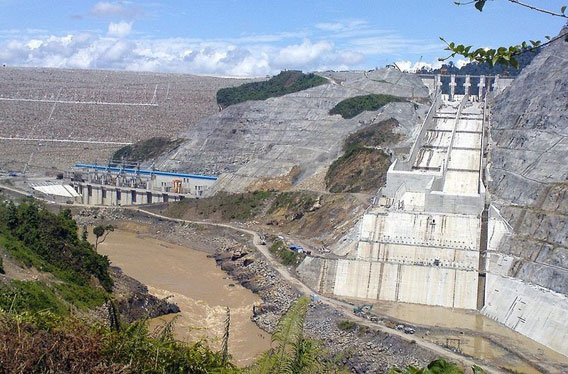 Bakun dam during construction. Photo by: Mohamad Shoox. Indigenous people from the Malaysian state of Sarawak have sent a letter to the German company, Fichtner GmbH & Co. KG, demanding that the consulting group halt all activities related to the hugely-controversial Baram dam, reports the NGO Bruno Manser Fund. Critics of the dam and it […]
Bakun dam during construction. Photo by: Mohamad Shoox. Indigenous people from the Malaysian state of Sarawak have sent a letter to the German company, Fichtner GmbH & Co. KG, demanding that the consulting group halt all activities related to the hugely-controversial Baram dam, reports the NGO Bruno Manser Fund. Critics of the dam and it […]
Over 700 people killed defending forest and land rights in past ten years
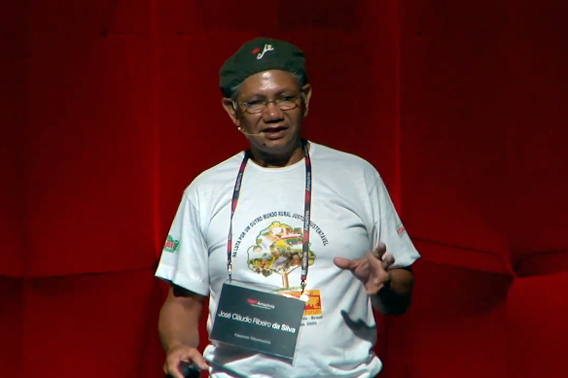 José Cláudio Ribeiro da Silva speaking at a TEDx Amazon in 2010, just a few months before he and his wife were assassinated for their activism. On May 24th, 2011, forest activist José Cláudio Ribeiro da Silva and his wife, Maria do Espírito Santo da Silva, were gunned down in an ambush in the Brazilian […]
José Cláudio Ribeiro da Silva speaking at a TEDx Amazon in 2010, just a few months before he and his wife were assassinated for their activism. On May 24th, 2011, forest activist José Cláudio Ribeiro da Silva and his wife, Maria do Espírito Santo da Silva, were gunned down in an ambush in the Brazilian […]
Indigenous rights rising in tropical forests, but big gaps remain
 Children in Dani village in West Papua, Indonesia. The Indonesian constitution gives the government ownership over all land and natural resources. Photo by: Rhett A. Butler. In the last twenty years, rights for indigenous forest dwellers have expanded significantly, according to a new report by the Rights and Resources Initiative (RRI). Covering nearly thirty tropical […]
Children in Dani village in West Papua, Indonesia. The Indonesian constitution gives the government ownership over all land and natural resources. Photo by: Rhett A. Butler. In the last twenty years, rights for indigenous forest dwellers have expanded significantly, according to a new report by the Rights and Resources Initiative (RRI). Covering nearly thirty tropical […]
Charting a new environmental course in China
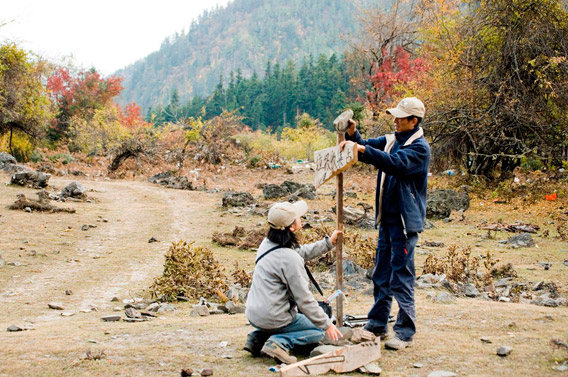 An interview with the Nature Conservancy’s China Program. TNC staff and volunteers repairing signage at Meili Snow Mountain National Park in northwest Yunnan. Community benefits and ecotourism are at the heart of TNC’s program to establish national parks in China. Photo by: Tang Ling. Founded in 1951, The Nature Conservancy (TNC) works in more than […]
An interview with the Nature Conservancy’s China Program. TNC staff and volunteers repairing signage at Meili Snow Mountain National Park in northwest Yunnan. Community benefits and ecotourism are at the heart of TNC’s program to establish national parks in China. Photo by: Tang Ling. Founded in 1951, The Nature Conservancy (TNC) works in more than […]
Animal picture of the day: the spotless cheetah
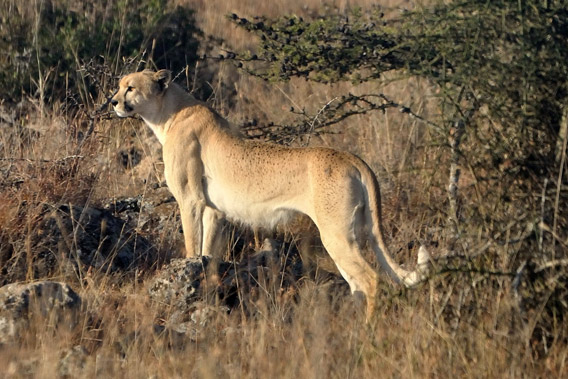 A spotless or golden cheetah in Kenya. Photo by: Guy Combes. A strange cheetah (Acinonyx jubatus) has been photographed in Kenya by wildlife artist Guy Combes. The “golden” cheetah’s telltale spots are bizarrely diluted. “Scientists believe it is a ‘morph’ due to a recessive gene and not an albino or leucistic variation which makes this […]
A spotless or golden cheetah in Kenya. Photo by: Guy Combes. A strange cheetah (Acinonyx jubatus) has been photographed in Kenya by wildlife artist Guy Combes. The “golden” cheetah’s telltale spots are bizarrely diluted. “Scientists believe it is a ‘morph’ due to a recessive gene and not an albino or leucistic variation which makes this […]
Mexico passes aggressive climate bill
 Sunrise in Cancun, Mexico, where the 2010 UN Climate Summit was held. Photo by: Rhett A. Butler. Last week, Mexico’s Senate passed an aggressive and comprehensive climate change bill, making it the first developing nation and only the second country to do so, after the UK. The bill, which far outshines anything achieved by its […]
Sunrise in Cancun, Mexico, where the 2010 UN Climate Summit was held. Photo by: Rhett A. Butler. Last week, Mexico’s Senate passed an aggressive and comprehensive climate change bill, making it the first developing nation and only the second country to do so, after the UK. The bill, which far outshines anything achieved by its […]
Pictures: Destruction of the Amazon’s Xingu River begins for Belo Monte Dam
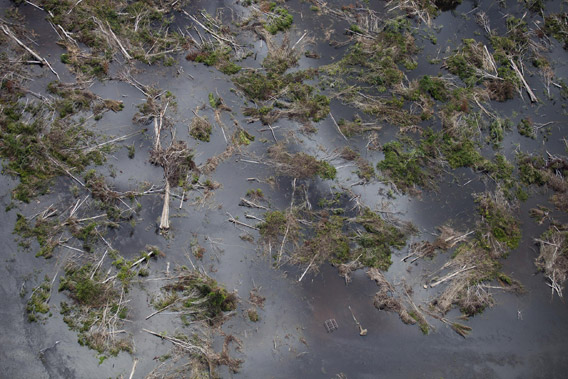 Aerial photo of the construction of a canal for the Belo Monte Dam project, near Altamira. Photo by © Greenpeace/Daniel Beltra. The Xingu River will never be the same. Construction of Belo Monte Dam has begun in the Brazilian Amazon, as shown by these photos taken by Greenpeace, some of the first images of the […]
Aerial photo of the construction of a canal for the Belo Monte Dam project, near Altamira. Photo by © Greenpeace/Daniel Beltra. The Xingu River will never be the same. Construction of Belo Monte Dam has begun in the Brazilian Amazon, as shown by these photos taken by Greenpeace, some of the first images of the […]
David vs. Goliath: Goldman Environmental Prize winners highlight development projects gone awry
 Right of left: Evgenia Chirikova, Edwin Gariguez, Ma Jun, Ikal Angelei, Caroline Cannon, and Sofia Gatica. Photo courtesy of Goldman Environmental Prize. A controversial dam, a massive mine, poisonous pesticides, a devastating road, and criminal polluters: many of this year’s Goldman Environmental Prize winners point to the dangers of poorly-planned, and ultimately destructive, development initiatives. […]
Right of left: Evgenia Chirikova, Edwin Gariguez, Ma Jun, Ikal Angelei, Caroline Cannon, and Sofia Gatica. Photo courtesy of Goldman Environmental Prize. A controversial dam, a massive mine, poisonous pesticides, a devastating road, and criminal polluters: many of this year’s Goldman Environmental Prize winners point to the dangers of poorly-planned, and ultimately destructive, development initiatives. […]
Police hired by loggers in Papua New Guinea lock locals in shipping containers
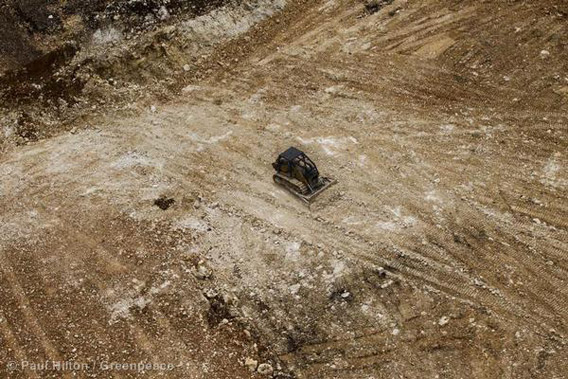 A bulldozer rumbles over a recently deforested area in Pomio District, East New Britain, Papua New Guinea. Photo by: Paul Hilton/Greenpeace. Locals protesting the destruction of their forest in Papua New Guinea for two palm oil plantations say police have been sent in for a second time to crack-down on their activities, even as a […]
A bulldozer rumbles over a recently deforested area in Pomio District, East New Britain, Papua New Guinea. Photo by: Paul Hilton/Greenpeace. Locals protesting the destruction of their forest in Papua New Guinea for two palm oil plantations say police have been sent in for a second time to crack-down on their activities, even as a […]
Papua New Guinea halts controversial nickel mine – for now
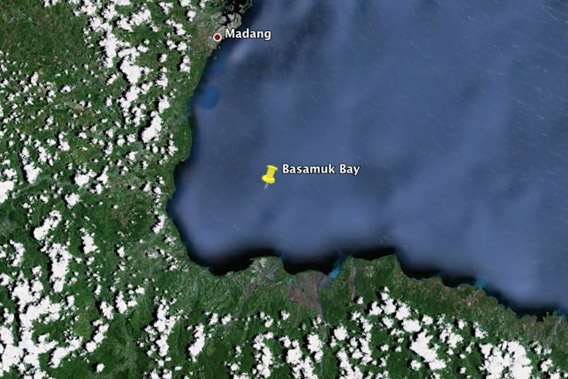 Basamuk Bay in Madang, Papua New Guinea. Photo produced using Google Earth. A massive, controversial nickel mine has been shut down in Papua New Guinea due to the environmental concerns of its slurry pipeline, reports Cultural Survival. Inspections of the 83 mile (134 kilometer) slurry pipeline found that it had been built too close to […]
Basamuk Bay in Madang, Papua New Guinea. Photo produced using Google Earth. A massive, controversial nickel mine has been shut down in Papua New Guinea due to the environmental concerns of its slurry pipeline, reports Cultural Survival. Inspections of the 83 mile (134 kilometer) slurry pipeline found that it had been built too close to […]
“Don’t be so silly” about climate change: Mohamed Nasheed on The Daily Show
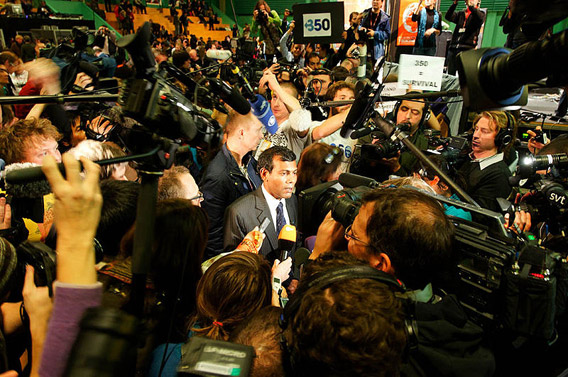 Former president of the Maldives, Mohamed Nasheed speaking to reporters at the Copenhagen Climate Summit in 2009. Photo by: Adam Welz. Mohamed Nasheed, former president of the Maldives, told the world on The Daily Show Monday night: “Just don’t be so silly” about climate change. Nasheed, who in February was forced to resign his presidency, […]
Former president of the Maldives, Mohamed Nasheed speaking to reporters at the Copenhagen Climate Summit in 2009. Photo by: Adam Welz. Mohamed Nasheed, former president of the Maldives, told the world on The Daily Show Monday night: “Just don’t be so silly” about climate change. Nasheed, who in February was forced to resign his presidency, […]
Judge suspends Brazilian dam that would flood sacred waterfalls
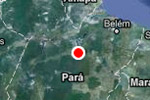 View Larger Map A federal judge has suspended the construction of a 1,820 megawatt dam on the Teles Pires River in the Amazon. The judge found that indigenous communities were not properly consulted about the dam, which would flood a sacred site, known as the Seven Waterfalls, as well as imperil the livelihoods of indigenous […]
View Larger Map A federal judge has suspended the construction of a 1,820 megawatt dam on the Teles Pires River in the Amazon. The judge found that indigenous communities were not properly consulted about the dam, which would flood a sacred site, known as the Seven Waterfalls, as well as imperil the livelihoods of indigenous […]
Turkey’s rich biodiversity at risk
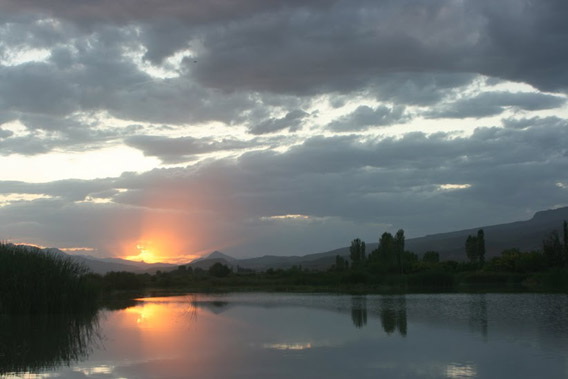 Turkey’s stunning landscapes and wildlife are under threat due to government ambivalence. Here, the sun sets outside Igdir, Turkey. Photo by: Cagan Sekercioglu. Turkey: the splendor of the Hagia Sophia, the ruins of Ephesus, and the bizarre caves of the Cappadocia. For foreign travelers, Turkey is a nation of cultural, religious, and historic wonders: a […]
Turkey’s stunning landscapes and wildlife are under threat due to government ambivalence. Here, the sun sets outside Igdir, Turkey. Photo by: Cagan Sekercioglu. Turkey: the splendor of the Hagia Sophia, the ruins of Ephesus, and the bizarre caves of the Cappadocia. For foreign travelers, Turkey is a nation of cultural, religious, and historic wonders: a […]
Oil exploration approved in Africa’s oldest park, Virunga National Park
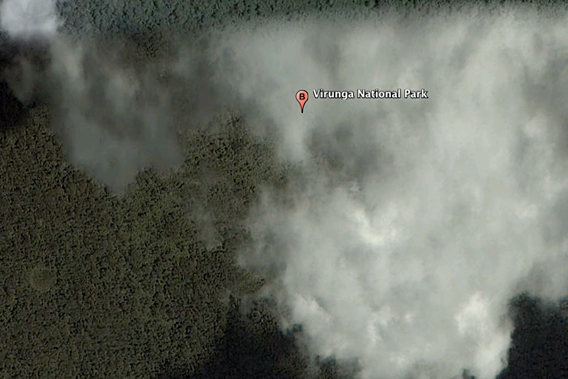 A portion of Virunga National Park swaddled in clouds as seen by Google Earth. Permits for controversial oil exploration in Virunga National Park have been released after request by NGO Global Witness. Oil company, SOCO International, has confirmed it has received two permits to undertake preliminary exploration, including seismic tests, in the UNESCO World Heritage […]
A portion of Virunga National Park swaddled in clouds as seen by Google Earth. Permits for controversial oil exploration in Virunga National Park have been released after request by NGO Global Witness. Oil company, SOCO International, has confirmed it has received two permits to undertake preliminary exploration, including seismic tests, in the UNESCO World Heritage […]
Scientists say massive palm oil plantation will “cut the heart out” of Cameroon’s rainforest
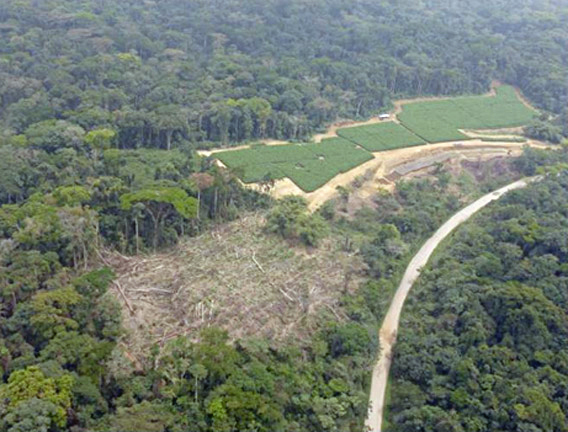 Aerial photographs of Talangaye oil palm nursery in Nguti subdivision of Herakles Farms planned oil palm plantation. Photographs taken in February 2012. Photographer wishes to remain anonymous. Eleven top scientists have slammed a proposed palm oil plantation in a Cameroonian rainforest surrounded by five protected areas. In an open letter, the researchers allege that Herakles […]
Aerial photographs of Talangaye oil palm nursery in Nguti subdivision of Herakles Farms planned oil palm plantation. Photographs taken in February 2012. Photographer wishes to remain anonymous. Eleven top scientists have slammed a proposed palm oil plantation in a Cameroonian rainforest surrounded by five protected areas. In an open letter, the researchers allege that Herakles […]
Without data, fate of great apes unknown
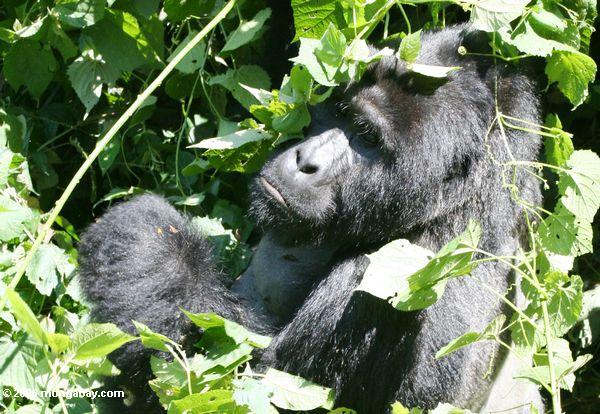 Improving the evidence base for African great ape conservation: An interview with Sandra Tranquilli. Silverback gorilla in Bwindi Impenetrable National Park, Uganda. Photo by: Rhett A. Butler. Our closest nonhuman relatives, the great apes, are in mortal danger. Every one of the six great ape species is endangered, and without more effective conservation measures, they […]
Improving the evidence base for African great ape conservation: An interview with Sandra Tranquilli. Silverback gorilla in Bwindi Impenetrable National Park, Uganda. Photo by: Rhett A. Butler. Our closest nonhuman relatives, the great apes, are in mortal danger. Every one of the six great ape species is endangered, and without more effective conservation measures, they […]
Innovative conservation: wild silk, endangered species, and poverty in Madagascar
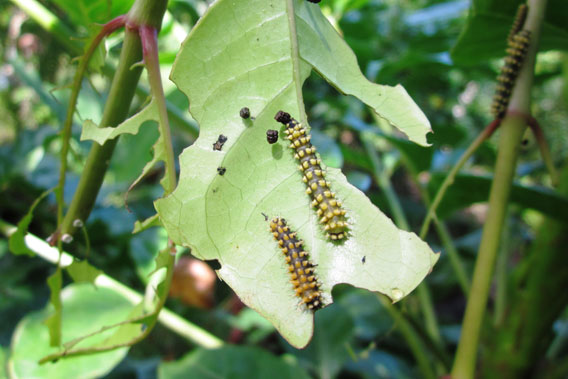 Moth larvae munching on a host plant. Photo by: Tom Corcoran. For anyone who works in conservation in Madagascar, confronting the complex difficulties of widespread poverty is a part of the job. But with the wealth of Madagascar’s wildlife rapidly diminishing— such as lemurs, miniature chameleons, and hedgehog-looking tenrecs found no-where else in the world—the […]
Moth larvae munching on a host plant. Photo by: Tom Corcoran. For anyone who works in conservation in Madagascar, confronting the complex difficulties of widespread poverty is a part of the job. But with the wealth of Madagascar’s wildlife rapidly diminishing— such as lemurs, miniature chameleons, and hedgehog-looking tenrecs found no-where else in the world—the […]
Activists form network to fight Sarawak dam-building spree
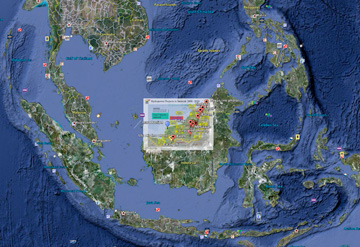 Last October indigenous groups, local people, and domestic NGOs formed the Save Sarawak’s Rivers Network to fight the planned construction of a dozen dams in the Malaysian state on the island of Borneo. The coalition opposes the dam-building plans, known as the Sarawak Corridor of Renewable Energy (SCORE) initiative, due to its impacts on indigenous […]
Last October indigenous groups, local people, and domestic NGOs formed the Save Sarawak’s Rivers Network to fight the planned construction of a dozen dams in the Malaysian state on the island of Borneo. The coalition opposes the dam-building plans, known as the Sarawak Corridor of Renewable Energy (SCORE) initiative, due to its impacts on indigenous […]
Photos: 208 species discovered in endangered Mekong region in 2010
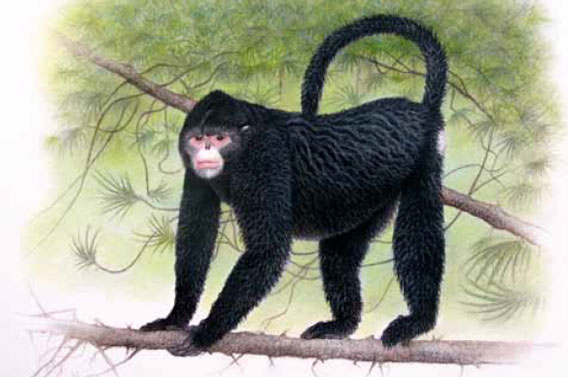 A new monkey, dubbed the Myanmar snub-nosed monkey (Rhinopithecus strykeri), was only discovered after researchers heard reports from hunters of a strange monkey with upturned nostrils and prominent lips in the remote Kachin region of Myanmar. It is known locally as mey nwoah, or ‘monkey with an upturned face’. Reportedly its easy to locate since […]
A new monkey, dubbed the Myanmar snub-nosed monkey (Rhinopithecus strykeri), was only discovered after researchers heard reports from hunters of a strange monkey with upturned nostrils and prominent lips in the remote Kachin region of Myanmar. It is known locally as mey nwoah, or ‘monkey with an upturned face’. Reportedly its easy to locate since […]
11 challenges facing 7 billion super-consumers
 The Turkana tribe of northern Kenya are buffeted by constant drought and food insecurity, which recent research says may be worsening due to climate change. Photo by: Rhett A. Butler. Perhaps the most disconcerting thing about Halloween this year is not the ghouls and goblins taking to the streets, but a baby born somewhere in […]
The Turkana tribe of northern Kenya are buffeted by constant drought and food insecurity, which recent research says may be worsening due to climate change. Photo by: Rhett A. Butler. Perhaps the most disconcerting thing about Halloween this year is not the ghouls and goblins taking to the streets, but a baby born somewhere in […]
Putting people to work: restoring our ecosystems, sequestering carbon
 Richard Blaustein is a freelance environmental journalist writing primarily on climate change, biodiversity, and genetic resource issues. He has written articles for BioScience, World Watch and Ecosystem Marketplace, and other publications. Reforestation project in Madagascar. Photo by: Rhett A. Butler. President Obama’s sole focus of his September 8th speech to the United States Congress was […]
Richard Blaustein is a freelance environmental journalist writing primarily on climate change, biodiversity, and genetic resource issues. He has written articles for BioScience, World Watch and Ecosystem Marketplace, and other publications. Reforestation project in Madagascar. Photo by: Rhett A. Butler. President Obama’s sole focus of his September 8th speech to the United States Congress was […]
Dole responds to allegations it is illegally growing bananas in national park
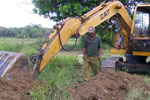 For more information on this issue: Dole destroying forest in national park for bananas Dole Food Company has responded to allegations that it is clearing land in a national park in Sri Lanka known for its population of elephants as well as a number of threatened species. According to reports, the US-based food giant has […]
For more information on this issue: Dole destroying forest in national park for bananas Dole Food Company has responded to allegations that it is clearing land in a national park in Sri Lanka known for its population of elephants as well as a number of threatened species. According to reports, the US-based food giant has […]
Kenya should embrace living with nature as the model for a healthier, wealthier nation
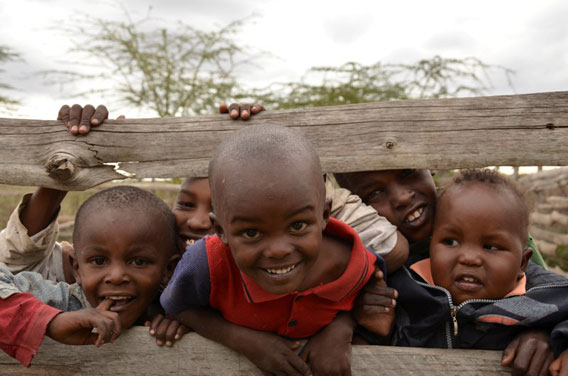 Kenyan native, Paula Kahumbu is the executive director of WildlifeDirect. She is the Winner of the National Geographic/Buffett award for conservation leadership in Africa 2011 and a National Geographic Emerging Explorer. These children’s parents have enlisted in a program where their 100 acres will remain unfenced, no subdivisions no land sales, no retaliatory killings of […]
Kenyan native, Paula Kahumbu is the executive director of WildlifeDirect. She is the Winner of the National Geographic/Buffett award for conservation leadership in Africa 2011 and a National Geographic Emerging Explorer. These children’s parents have enlisted in a program where their 100 acres will remain unfenced, no subdivisions no land sales, no retaliatory killings of […]
Peru passes landmark indigenous rights legislation
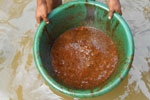 A new administration in Peru is moving toward granting indigenous people long-sought legal rights, reports Survival International. Yesterday, the Peruvian congress approved new legislation that gives indigenous people free, prior and informed consent (FPIC) for any project on their land. If signed into law and enforced, the legislation would provide indigenous groups considerable clout in […]
A new administration in Peru is moving toward granting indigenous people long-sought legal rights, reports Survival International. Yesterday, the Peruvian congress approved new legislation that gives indigenous people free, prior and informed consent (FPIC) for any project on their land. If signed into law and enforced, the legislation would provide indigenous groups considerable clout in […]
National parks do not contribute to poverty, finds decade-long study
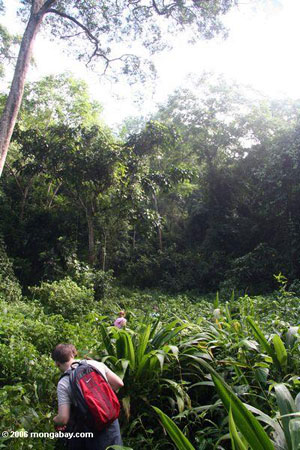 A new study of Uganda’s Kibale National Park refutes the conventional wisdom that parks cause poverty along their borders. “Apparently the park provides a source of insurance; [locals] can hunt, or sell firewood or thatch from the park,” explains Jennifer Alix-Garcia, co-author of the study, with the University of Wisconsin, Madison. “It’s misleading. If you […]
A new study of Uganda’s Kibale National Park refutes the conventional wisdom that parks cause poverty along their borders. “Apparently the park provides a source of insurance; [locals] can hunt, or sell firewood or thatch from the park,” explains Jennifer Alix-Garcia, co-author of the study, with the University of Wisconsin, Madison. “It’s misleading. If you […]
The importance of recognizing viewpoints in a rapidly changing world
 Part two of two Is this palm oil plantation good, bad, or something else altogether? Photo by: Rhett A. Butler. Is oil palm bad? Is protecting tropical forests more important than converting them for economic development? Should we spike trees to make sure no one cuts them down? Answers to these questions depend on which […]
Part two of two Is this palm oil plantation good, bad, or something else altogether? Photo by: Rhett A. Butler. Is oil palm bad? Is protecting tropical forests more important than converting them for economic development? Should we spike trees to make sure no one cuts them down? Answers to these questions depend on which […]
Richard Leakey: ‘selfish’ critics choose wrong fight in Serengeti road
 To read more about Tanzania’s recent announcement related to the Serengeti road: Unpaved road through Serengeti to progress. The controversial Serengeti road is going ahead, but with conditions. According to the Tanzanian Minister for Natural Resources and Tourism, Ezekiel Maige, the road will not be paved and it will be run by the Tanzanian park […]
To read more about Tanzania’s recent announcement related to the Serengeti road: Unpaved road through Serengeti to progress. The controversial Serengeti road is going ahead, but with conditions. According to the Tanzanian Minister for Natural Resources and Tourism, Ezekiel Maige, the road will not be paved and it will be run by the Tanzanian park […]
Food security in developing world threatened by climate change
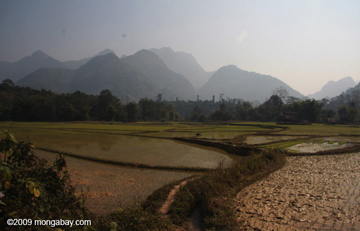 If swift action is not taken to prepare farmers in the developing world for hotter, drier, shorter growing seasons, climate change may threaten the lives of hundreds of millions of people by 2050. People in Africa and South Asia are particularly at risk of further impoverishment and hunger in a warmer world. According to the […]
If swift action is not taken to prepare farmers in the developing world for hotter, drier, shorter growing seasons, climate change may threaten the lives of hundreds of millions of people by 2050. People in Africa and South Asia are particularly at risk of further impoverishment and hunger in a warmer world. According to the […]
Conservation organizations ask Tanzania to reconsider UNESCO status for Eastern Arc Mountains
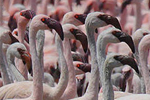 Tanzanian President Jakaya Kikwete has recently stated he would withdraw the application to list two Eastern Arc Mountains as UNESCO World Heritage sites: Udzungwa and Uluguru Mountains. However, ten NGOS, both local and international, have asked the president to reconsider, according to The Citizen. President Kikwete had said the withdrawal was necessary because the mountains […]
Tanzanian President Jakaya Kikwete has recently stated he would withdraw the application to list two Eastern Arc Mountains as UNESCO World Heritage sites: Udzungwa and Uluguru Mountains. However, ten NGOS, both local and international, have asked the president to reconsider, according to The Citizen. President Kikwete had said the withdrawal was necessary because the mountains […]
From the Serengeti to Lake Natron: is the Tanzanian government aiming to destroy its wildlife and lands?
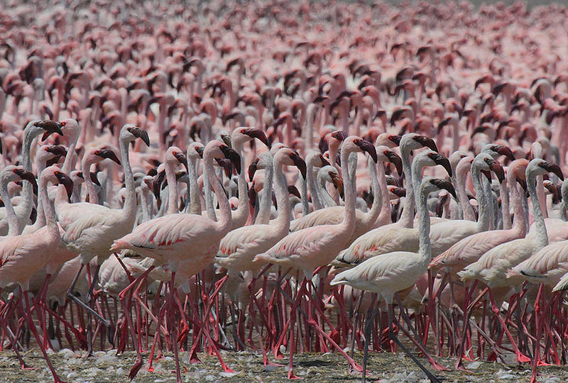 Thousands of lesser flamingoes (Phoenicopterus minor) crowd in Lake Bogoria in Kenya. Nearly all of these flamingoes will breed in Tanzania’s Lake Natron, now a proposed site for soda ash mining. Photo by: Steve Garvie. What’s happening in Tanzania? This is a question making the rounds in conservation and environmental circles. Why is a nation […]
Thousands of lesser flamingoes (Phoenicopterus minor) crowd in Lake Bogoria in Kenya. Nearly all of these flamingoes will breed in Tanzania’s Lake Natron, now a proposed site for soda ash mining. Photo by: Steve Garvie. What’s happening in Tanzania? This is a question making the rounds in conservation and environmental circles. Why is a nation […]
Cambodia approves rubber plantation—in national park
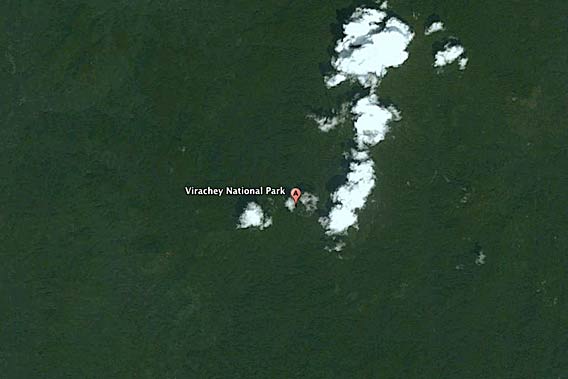 The Cambodian Prime Minister, Hun Sen, has approved a 9,000 hectare (22,200 acre) rubber plantation in Virachey National Park despite its status as a protected area, reports the Phnom Penh Post. The park is also listed as an ASEAN Heritage Park. Spanning 332,500 hectares in Ratanakkiri province, Virachey National Park, is Cambodia’s largest. The concession […]
The Cambodian Prime Minister, Hun Sen, has approved a 9,000 hectare (22,200 acre) rubber plantation in Virachey National Park despite its status as a protected area, reports the Phnom Penh Post. The park is also listed as an ASEAN Heritage Park. Spanning 332,500 hectares in Ratanakkiri province, Virachey National Park, is Cambodia’s largest. The concession […]
Indigenous leaders take fight over Amazon dams to Europe
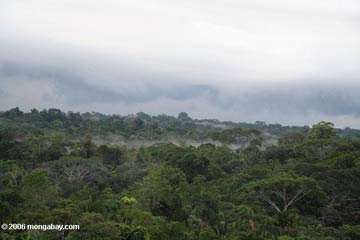 Three indigenous Amazonian leaders spent this week touring Europe to raise awareness about the threat that a number of proposed monster dams pose to their people and the Amazon forest. Culminating in a press conference and protests in London, the international trip hopes to build pressure to stop three current hydroelectric projects, one in Peru, […]
Three indigenous Amazonian leaders spent this week touring Europe to raise awareness about the threat that a number of proposed monster dams pose to their people and the Amazon forest. Culminating in a press conference and protests in London, the international trip hopes to build pressure to stop three current hydroelectric projects, one in Peru, […]
Good stewards of forests at home outsource deforestation abroad
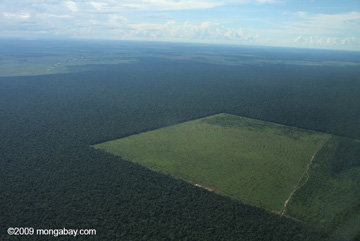 As more nations adopt better laws and policies to save and restore forests at home, they may, in fact, be outsourcing deforestation to other parts of the world, according to a new study in the Proceedings of the National Academy of Sciences (PNAS). Looking at six developing nations where forests are recovering—instead of receding—the study […]
As more nations adopt better laws and policies to save and restore forests at home, they may, in fact, be outsourcing deforestation to other parts of the world, according to a new study in the Proceedings of the National Academy of Sciences (PNAS). Looking at six developing nations where forests are recovering—instead of receding—the study […]
Environmentalists must recognize ‘biases and delusions’ to succeed
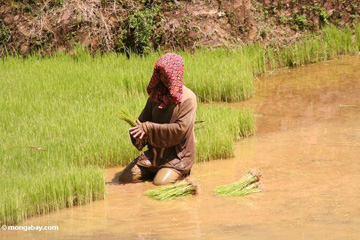 As nations from around the world meet at the Convention on Biological Diversity in Nagoya, Japan to discuss ways to stem the loss of biodiversity worldwide, two prominent researchers argue that environmentalists and conservationists need to consider paradigm shifts if biodiversity is to be preserved, especially in developing countries. Writing in the journal Biotropica, Douglas […]
As nations from around the world meet at the Convention on Biological Diversity in Nagoya, Japan to discuss ways to stem the loss of biodiversity worldwide, two prominent researchers argue that environmentalists and conservationists need to consider paradigm shifts if biodiversity is to be preserved, especially in developing countries. Writing in the journal Biotropica, Douglas […]
Feeds: news | india | latam | brasil | indonesia
 With demand for seafood increasing and numerous fish species declining due to overfishing and other threats, scientists are proposing a seemingly drastic solution: close the high seas to fishing and turn it into “a fish bank for the world.” Don’t worry, they say, doing so won’t affect the fishing industry’s economic returns, and will ensure […]
With demand for seafood increasing and numerous fish species declining due to overfishing and other threats, scientists are proposing a seemingly drastic solution: close the high seas to fishing and turn it into “a fish bank for the world.” Don’t worry, they say, doing so won’t affect the fishing industry’s economic returns, and will ensure […] A fishing boat off the coast of the Malaysian state of Sabah. Photo by: Rhett Butler. Consumers in the developed world want sustainably sourced seafood and increasingly retailers like Walmart in the U.S. and Sainsbury’s in the U.K. are promising it to them. But there just isn’t enough certified-sustainable seafood to meet demand. Enter fishery […]
A fishing boat off the coast of the Malaysian state of Sabah. Photo by: Rhett Butler. Consumers in the developed world want sustainably sourced seafood and increasingly retailers like Walmart in the U.S. and Sainsbury’s in the U.K. are promising it to them. But there just isn’t enough certified-sustainable seafood to meet demand. Enter fishery […] Straw-colored fruit bat (Eidolon helvum) at the Zoological Garden Berlin, Germany. This species, along with other fruit bats, is present in the Ebola impacted area and may have been a carrier. Photo by: Fritz Geller-Grimm/Creative Commons 2.5. The Ebola outbreak in West Africa may have been the result of complex economic and agricultural policies developed […]
Straw-colored fruit bat (Eidolon helvum) at the Zoological Garden Berlin, Germany. This species, along with other fruit bats, is present in the Ebola impacted area and may have been a carrier. Photo by: Fritz Geller-Grimm/Creative Commons 2.5. The Ebola outbreak in West Africa may have been the result of complex economic and agricultural policies developed […] For those living either north or south of the tropics, images of this green ring around the Earth’s equator often include verdant rainforests, exotic animals, and unchanging weather; but they may also be of entrenched poverty, unstable governments, and appalling environmental destruction. A massive new report, The State of the Tropics, however, finds that the […]
For those living either north or south of the tropics, images of this green ring around the Earth’s equator often include verdant rainforests, exotic animals, and unchanging weather; but they may also be of entrenched poverty, unstable governments, and appalling environmental destruction. A massive new report, The State of the Tropics, however, finds that the […] The Chinese Premier, Li Keqiang, has pledged $10 million [see note below] to combat poaching in Africa during a visit to the African Union headquarters in Addis Ababa. The fund is a part of a much larger loan package for the continent from China, totaling $10 billion in credit and $2 billion in aid. The […]
The Chinese Premier, Li Keqiang, has pledged $10 million [see note below] to combat poaching in Africa during a visit to the African Union headquarters in Addis Ababa. The fund is a part of a much larger loan package for the continent from China, totaling $10 billion in credit and $2 billion in aid. The […] Verreaux’s Sifaka (Propithecus verreauxi), listed as Vulnerable, in a heated chase. Photo by: Rhett A. Butler. Due to the wonderful idiosyncrasies of evolution, there is one country on Earth that houses 20 percent of the world’s primates. More astounding still, every single one of these primates—an entire distinct family in fact—are found no-where else. The […]
Verreaux’s Sifaka (Propithecus verreauxi), listed as Vulnerable, in a heated chase. Photo by: Rhett A. Butler. Due to the wonderful idiosyncrasies of evolution, there is one country on Earth that houses 20 percent of the world’s primates. More astounding still, every single one of these primates—an entire distinct family in fact—are found no-where else. The […].600.jpg) In 2011, the top 11 richest carbon emitters spent an estimated $74 billion on fossil fuel subsidies, or seven times the amount spent on fast-track climate financing to developing nations, according to a recent report by the Overseas Development Institute. Worldwide, nations spent over half a trillion dollars on fossil fuel subsidies in 2011 according […]
In 2011, the top 11 richest carbon emitters spent an estimated $74 billion on fossil fuel subsidies, or seven times the amount spent on fast-track climate financing to developing nations, according to a recent report by the Overseas Development Institute. Worldwide, nations spent over half a trillion dollars on fossil fuel subsidies in 2011 according […] Colombia rules against multinational corporation that demanded disciplining of environment officials. Colombian authorities have ruled that local environmental officials acted correctly in ordering South African mining giant AngloGold Ashanti to halt their work, following demands from the multinational corporation for their disciplining. Cortolima, the environmental authority of the department of Tolima in central Colombia, stopped […]
Colombia rules against multinational corporation that demanded disciplining of environment officials. Colombian authorities have ruled that local environmental officials acted correctly in ordering South African mining giant AngloGold Ashanti to halt their work, following demands from the multinational corporation for their disciplining. Cortolima, the environmental authority of the department of Tolima in central Colombia, stopped […] As Peru’s legislature debates the merits of building the Purús highway through the Amazon rainforest, a new report by Global Witness alleges that the project has been aggressively pushed by those with a financial stake in opening up the remote area to logging and mining. Roads built in the Amazon lead to spikes in deforestation, […]
As Peru’s legislature debates the merits of building the Purús highway through the Amazon rainforest, a new report by Global Witness alleges that the project has been aggressively pushed by those with a financial stake in opening up the remote area to logging and mining. Roads built in the Amazon lead to spikes in deforestation, […] Home to giant catfish and stingrays, feeding over 60 million people, and with the largest abundance of freshwater fish in the world, the Mekong River, and its numerous tributaries, brings food, culture, and life to much of Southeast Asia. Despite this, little is known about the biodiversity and ecosystems of the Mekong, which is second […]
Home to giant catfish and stingrays, feeding over 60 million people, and with the largest abundance of freshwater fish in the world, the Mekong River, and its numerous tributaries, brings food, culture, and life to much of Southeast Asia. Despite this, little is known about the biodiversity and ecosystems of the Mekong, which is second […] A survey late last year found that the Yangtze finless porpoise (Neophocaena asiaeorientalis asiaeorientalis) population has been cut in half in just six years. During a 44-day survey, experts estimated 1,000 river porpoises inhabited the river and adjoining lakes, down from around 2,000 in 2006. The ecology of China’s Yangtze River has been decimated the […]
A survey late last year found that the Yangtze finless porpoise (Neophocaena asiaeorientalis asiaeorientalis) population has been cut in half in just six years. During a 44-day survey, experts estimated 1,000 river porpoises inhabited the river and adjoining lakes, down from around 2,000 in 2006. The ecology of China’s Yangtze River has been decimated the […] One kilometer off the Philippine island of Palawan lies the Rasa Island Wildlife Sanctuary; here forest grows unimpeded from a coral island surrounded by mangroves and coral reefs. Although tiny, over a hundred bird species have been recorded on the island along with a major population of large flying foxes, while in the waters below […]
One kilometer off the Philippine island of Palawan lies the Rasa Island Wildlife Sanctuary; here forest grows unimpeded from a coral island surrounded by mangroves and coral reefs. Although tiny, over a hundred bird species have been recorded on the island along with a major population of large flying foxes, while in the waters below […] Barro Blanco hydroelectric dam under construction. Photo courtesy of Robin Oisín Llewellyn. A Ngäbe indigenous Panamanian, Onesimo Rodriguez, opposing the Barro Blanco hydroelectric dam project was killed last Friday evening by four masked men. His body was then thrown into a nearby stream where it was discovered the following day. Onesimo Rodriguez was attacked with […]
Barro Blanco hydroelectric dam under construction. Photo courtesy of Robin Oisín Llewellyn. A Ngäbe indigenous Panamanian, Onesimo Rodriguez, opposing the Barro Blanco hydroelectric dam project was killed last Friday evening by four masked men. His body was then thrown into a nearby stream where it was discovered the following day. Onesimo Rodriguez was attacked with […] Organic vegetables for sale in Argentina. Photo by: René Piamonte. The global farmland area certified organic has expanded more than threefold to 37 million hectares since 1999, according to new research conducted by the Worldwatch Institute. The Institute argues that organic farming has the potential to contribute to sustainable food security by improving nutrition intake […]
Organic vegetables for sale in Argentina. Photo by: René Piamonte. The global farmland area certified organic has expanded more than threefold to 37 million hectares since 1999, according to new research conducted by the Worldwatch Institute. The Institute argues that organic farming has the potential to contribute to sustainable food security by improving nutrition intake […] Bhagwat Saw, 69, in hospital after he was diagnosed with pneumoconiosis. He has been working as a coal loader for over 40 years. © Peter Caton / Greenpeace. India’s dependence on coal-fired power plants for energy may be leading directly to the deaths of 80,000 to 115,000 of its citizens every year, according to the […]
Bhagwat Saw, 69, in hospital after he was diagnosed with pneumoconiosis. He has been working as a coal loader for over 40 years. © Peter Caton / Greenpeace. India’s dependence on coal-fired power plants for energy may be leading directly to the deaths of 80,000 to 115,000 of its citizens every year, according to the […] Rainforest in Sabah, Malaysia on the island of Borneo. Photo by: Rhett A. Butler. A new video highlights the work and drive of renewable energy proponents at the inaugural meeting of Southeast Asia Renewable Energy People’s Assembly (SEAREPA) in the Malaysian state of Sabah. Held last year, the meeting brought together 80 organizations from 12 […]
Rainforest in Sabah, Malaysia on the island of Borneo. Photo by: Rhett A. Butler. A new video highlights the work and drive of renewable energy proponents at the inaugural meeting of Southeast Asia Renewable Energy People’s Assembly (SEAREPA) in the Malaysian state of Sabah. Held last year, the meeting brought together 80 organizations from 12 […] A fence keeps locals from their traditional lands in Liberia, where Sime Darby has planted a contested palm oil plantation. Photo courtesy of the Rights and Resources Initiative (RRI). Investing in companies that flout local community rights in developing countries often leads to severe economic losses, according to a new report from the Rights and […]
A fence keeps locals from their traditional lands in Liberia, where Sime Darby has planted a contested palm oil plantation. Photo courtesy of the Rights and Resources Initiative (RRI). Investing in companies that flout local community rights in developing countries often leads to severe economic losses, according to a new report from the Rights and […] Clearing of trees in a concession area of Herakles Farm’s area for a palm oil plantation. Greenpeace says these clearings are illegal since Herakles’ lease has not been given final approval. Herakles Farm did not respond to request for comment. Photo: © Greenpeace/Alex Yallop. Newly released photos by Greenpeace show the dramatic destruction of tropical […]
Clearing of trees in a concession area of Herakles Farm’s area for a palm oil plantation. Greenpeace says these clearings are illegal since Herakles’ lease has not been given final approval. Herakles Farm did not respond to request for comment. Photo: © Greenpeace/Alex Yallop. Newly released photos by Greenpeace show the dramatic destruction of tropical […] Gaysay Grasslands in Bale Mountains National Park. Photo courtesy of the Frankfurt Zoological Society (FZS). There is a place in the world where wolves live almost entirely off mountain rodents, lions dwell in forests, and freshwater rolls downstream to 12 million people, but the place—Ethiopia’s Bale Mountains National Park—remains imperiled by a lack of legal […]
Gaysay Grasslands in Bale Mountains National Park. Photo courtesy of the Frankfurt Zoological Society (FZS). There is a place in the world where wolves live almost entirely off mountain rodents, lions dwell in forests, and freshwater rolls downstream to 12 million people, but the place—Ethiopia’s Bale Mountains National Park—remains imperiled by a lack of legal […] Lesser flamingoes in Kenya. One third of the world’s lesser flamingoes nest in Tanzania’s Lake Natron. Photo by: Steve Garvie. In a choice between flamingoes and a soda ash plant, a new report shows that local residents near Lake Natron, Tanzania prefer flamingoes. This is good news for conservationists as the area is the most […]
Lesser flamingoes in Kenya. One third of the world’s lesser flamingoes nest in Tanzania’s Lake Natron. Photo by: Steve Garvie. In a choice between flamingoes and a soda ash plant, a new report shows that local residents near Lake Natron, Tanzania prefer flamingoes. This is good news for conservationists as the area is the most […] Kenyir Wildlife Corridor in northeast Malaysia is teeming with wildlife: elephants, gibbons, tigers, tapirs, and even black panthers (melanistic leopards) have been recorded in the 60 kilometer (37 mile) stretch of forest. In fact, researchers have recorded over 40 mammal species (see species list below), including 15 threatened with extinction according to the IUCN Red […]
Kenyir Wildlife Corridor in northeast Malaysia is teeming with wildlife: elephants, gibbons, tigers, tapirs, and even black panthers (melanistic leopards) have been recorded in the 60 kilometer (37 mile) stretch of forest. In fact, researchers have recorded over 40 mammal species (see species list below), including 15 threatened with extinction according to the IUCN Red […] The Mekong River in Thailand. Photo by: Rhett A. Butler. Laos has given approval to the hugely-controversial $3.5 billion Xayaburi Dam on the Mekong River, reports the BBC. The massive dam, which would provide 95 percent of its energy production to Thailand, has been criticized for anticipated impacts on the river’s fish populations, on which […]
The Mekong River in Thailand. Photo by: Rhett A. Butler. Laos has given approval to the hugely-controversial $3.5 billion Xayaburi Dam on the Mekong River, reports the BBC. The massive dam, which would provide 95 percent of its energy production to Thailand, has been criticized for anticipated impacts on the river’s fish populations, on which […] Participants from diverse backgrounds and groups marking on a map the creation of partnerships through identified projects at the end of the Southeast Asia Renewable Energy People’s Assembly (SEAREPA) at the Rainforest Discovery Centre in Sandakan, Sabah. Photo by: Suzanne Chong/LEAP. The first ever meeting of the Southeast Asia Renewable Energy People’s Assembly (SEAREPA) ended […]
Participants from diverse backgrounds and groups marking on a map the creation of partnerships through identified projects at the end of the Southeast Asia Renewable Energy People’s Assembly (SEAREPA) at the Rainforest Discovery Centre in Sandakan, Sabah. Photo by: Suzanne Chong/LEAP. The first ever meeting of the Southeast Asia Renewable Energy People’s Assembly (SEAREPA) ended […] A participant sharing a story at the inaugural Southeast Asia Renewable Energy People’s Assembly (SEAREPA) at the Rainforest Discovery Centre in Sandakan, Sabah. Photo courtesy of SEAREPA. Last year, a coalition of environmentalists and locals won a David-versus-Goliath battle against a massive coal plant in the Malaysian state of Sabah on Borneo. After facing a […]
A participant sharing a story at the inaugural Southeast Asia Renewable Energy People’s Assembly (SEAREPA) at the Rainforest Discovery Centre in Sandakan, Sabah. Photo courtesy of SEAREPA. Last year, a coalition of environmentalists and locals won a David-versus-Goliath battle against a massive coal plant in the Malaysian state of Sabah on Borneo. After facing a […] Belo Monte location. Courtesy of Google Earth. Construction on Brazil’s megadam, Belo Monte, has been halted again as around 150 demonstrators, most of them from nearby indigenous tribes, have occupied the main construction site at Pimental. Over a hundred indigenous people joined local fishermen who had been protesting the dam for 24 days straight. Indigenous […]
Belo Monte location. Courtesy of Google Earth. Construction on Brazil’s megadam, Belo Monte, has been halted again as around 150 demonstrators, most of them from nearby indigenous tribes, have occupied the main construction site at Pimental. Over a hundred indigenous people joined local fishermen who had been protesting the dam for 24 days straight. Indigenous […] The Turkana people fear their ecosystem will be gravely impacted by the Gibe III dam on the Omo River. Photo by: Rhett A. Butler. Originally refusing to provide funding to Ethiopia’s controversial Gibe III hydroelectric dam, the World Bank has now announced plans to fund the power lines that will carry generated electricity away from […]
The Turkana people fear their ecosystem will be gravely impacted by the Gibe III dam on the Omo River. Photo by: Rhett A. Butler. Originally refusing to provide funding to Ethiopia’s controversial Gibe III hydroelectric dam, the World Bank has now announced plans to fund the power lines that will carry generated electricity away from […] The Democratic Republic of Congo (DRC)’s last herd of zebra run free in Upemba. Photo courtesy of the FZS. Zebra racing across the yellow-green savannah is an iconic image for Africa, but imagine you’re seeing this not in Kenya or South Africa, but in the Democratic Republic of Congo (DRC). Welcome to Upemba National Park: […]
The Democratic Republic of Congo (DRC)’s last herd of zebra run free in Upemba. Photo courtesy of the FZS. Zebra racing across the yellow-green savannah is an iconic image for Africa, but imagine you’re seeing this not in Kenya or South Africa, but in the Democratic Republic of Congo (DRC). Welcome to Upemba National Park: […] A fisherman on the Mekong River in Laos. Photo by: Rhett A. Butler. Fish are a hugely important protein source for many people around the world. This is no more evident than along the lower Mekong River delta where an estimated 48 million people depend directly on the river for food and livelihoods. But now […]
A fisherman on the Mekong River in Laos. Photo by: Rhett A. Butler. Fish are a hugely important protein source for many people around the world. This is no more evident than along the lower Mekong River delta where an estimated 48 million people depend directly on the river for food and livelihoods. But now […] View from Varandha Pass in the Western Ghats. A massive expert panel report on the conservation of the Western Ghats has caused a political stir in India. The report, headed by noted ecologist Madhav Gadgil, recommends that the government phase out mining projects, cancel damaging hydroelectric projects, and move toward organic agriculture in ecologically-sensitive sections […]
View from Varandha Pass in the Western Ghats. A massive expert panel report on the conservation of the Western Ghats has caused a political stir in India. The report, headed by noted ecologist Madhav Gadgil, recommends that the government phase out mining projects, cancel damaging hydroelectric projects, and move toward organic agriculture in ecologically-sensitive sections […] Africa’s Wildest Stories is a new initiative in Kenya to capture personal stories about the relationship of people to nature. Elephant Keeper Mishak Nzimbi (above) has been working at the David Sheldrick center since he was a teenager. It’s a job he would never give up for anything. He is an ordinary man living an […]
Africa’s Wildest Stories is a new initiative in Kenya to capture personal stories about the relationship of people to nature. Elephant Keeper Mishak Nzimbi (above) has been working at the David Sheldrick center since he was a teenager. It’s a job he would never give up for anything. He is an ordinary man living an […] View Larger Map Evidence of indigenous people living in “voluntary isolation” in a remote part of the Amazon has been found where an Italian Catholic priest is campaigning for Peru’s government to build a highway. The discovery is controversial because the priest has questioned the existence of the isolated people, sometimes referred to as uncontacted, […]
View Larger Map Evidence of indigenous people living in “voluntary isolation” in a remote part of the Amazon has been found where an Italian Catholic priest is campaigning for Peru’s government to build a highway. The discovery is controversial because the priest has questioned the existence of the isolated people, sometimes referred to as uncontacted, […].568.jpg) SOCCKET: the soccer ball that produces electricity. Photo courtesy of Uncharted Play. Recently, Jessica O. Matthews and Julia Silverman, both Harvard graduates, were awarded Harvard Foundation’s Scientists of the Year award for their invention of a soccer ball that converts kinetic energy to electricity. The two women, who were both social science majors, came up […]
SOCCKET: the soccer ball that produces electricity. Photo courtesy of Uncharted Play. Recently, Jessica O. Matthews and Julia Silverman, both Harvard graduates, were awarded Harvard Foundation’s Scientists of the Year award for their invention of a soccer ball that converts kinetic energy to electricity. The two women, who were both social science majors, came up […] Deforestation of tropical forests for oil palm plantations in Sabah, Malaysia. Palm oil is one of over 15,000 commodities in a recent study that have been linked to biodiversity loss in developing countries connected to consumption abroad. Photo by: Rhett A. Butler. Consumption in wealthy nations is imperiling biodiversity abroad, according to a new study […]
Deforestation of tropical forests for oil palm plantations in Sabah, Malaysia. Palm oil is one of over 15,000 commodities in a recent study that have been linked to biodiversity loss in developing countries connected to consumption abroad. Photo by: Rhett A. Butler. Consumption in wealthy nations is imperiling biodiversity abroad, according to a new study […] A Malagasy girl. While Madagascar faces widespread deforestation and erosion, it is estimated that 70 percent of its people suffer from malnutrition. The Rio+20 Summit is attempting to tackle both environmental degradation and poverty, but civil groups say the agreement falls far short of what is needed. Photo by: Rhett A. Butler. As world leaders […]
A Malagasy girl. While Madagascar faces widespread deforestation and erosion, it is estimated that 70 percent of its people suffer from malnutrition. The Rio+20 Summit is attempting to tackle both environmental degradation and poverty, but civil groups say the agreement falls far short of what is needed. Photo by: Rhett A. Butler. As world leaders […] Bakun dam during construction. Photo by: Mohamad Shoox. Indigenous people from the Malaysian state of Sarawak have sent a letter to the German company, Fichtner GmbH & Co. KG, demanding that the consulting group halt all activities related to the hugely-controversial Baram dam, reports the NGO Bruno Manser Fund. Critics of the dam and it […]
Bakun dam during construction. Photo by: Mohamad Shoox. Indigenous people from the Malaysian state of Sarawak have sent a letter to the German company, Fichtner GmbH & Co. KG, demanding that the consulting group halt all activities related to the hugely-controversial Baram dam, reports the NGO Bruno Manser Fund. Critics of the dam and it […] José Cláudio Ribeiro da Silva speaking at a TEDx Amazon in 2010, just a few months before he and his wife were assassinated for their activism. On May 24th, 2011, forest activist José Cláudio Ribeiro da Silva and his wife, Maria do Espírito Santo da Silva, were gunned down in an ambush in the Brazilian […]
José Cláudio Ribeiro da Silva speaking at a TEDx Amazon in 2010, just a few months before he and his wife were assassinated for their activism. On May 24th, 2011, forest activist José Cláudio Ribeiro da Silva and his wife, Maria do Espírito Santo da Silva, were gunned down in an ambush in the Brazilian […] Children in Dani village in West Papua, Indonesia. The Indonesian constitution gives the government ownership over all land and natural resources. Photo by: Rhett A. Butler. In the last twenty years, rights for indigenous forest dwellers have expanded significantly, according to a new report by the Rights and Resources Initiative (RRI). Covering nearly thirty tropical […]
Children in Dani village in West Papua, Indonesia. The Indonesian constitution gives the government ownership over all land and natural resources. Photo by: Rhett A. Butler. In the last twenty years, rights for indigenous forest dwellers have expanded significantly, according to a new report by the Rights and Resources Initiative (RRI). Covering nearly thirty tropical […] An interview with the Nature Conservancy’s China Program. TNC staff and volunteers repairing signage at Meili Snow Mountain National Park in northwest Yunnan. Community benefits and ecotourism are at the heart of TNC’s program to establish national parks in China. Photo by: Tang Ling. Founded in 1951, The Nature Conservancy (TNC) works in more than […]
An interview with the Nature Conservancy’s China Program. TNC staff and volunteers repairing signage at Meili Snow Mountain National Park in northwest Yunnan. Community benefits and ecotourism are at the heart of TNC’s program to establish national parks in China. Photo by: Tang Ling. Founded in 1951, The Nature Conservancy (TNC) works in more than […] A spotless or golden cheetah in Kenya. Photo by: Guy Combes. A strange cheetah (Acinonyx jubatus) has been photographed in Kenya by wildlife artist Guy Combes. The “golden” cheetah’s telltale spots are bizarrely diluted. “Scientists believe it is a ‘morph’ due to a recessive gene and not an albino or leucistic variation which makes this […]
A spotless or golden cheetah in Kenya. Photo by: Guy Combes. A strange cheetah (Acinonyx jubatus) has been photographed in Kenya by wildlife artist Guy Combes. The “golden” cheetah’s telltale spots are bizarrely diluted. “Scientists believe it is a ‘morph’ due to a recessive gene and not an albino or leucistic variation which makes this […] Sunrise in Cancun, Mexico, where the 2010 UN Climate Summit was held. Photo by: Rhett A. Butler. Last week, Mexico’s Senate passed an aggressive and comprehensive climate change bill, making it the first developing nation and only the second country to do so, after the UK. The bill, which far outshines anything achieved by its […]
Sunrise in Cancun, Mexico, where the 2010 UN Climate Summit was held. Photo by: Rhett A. Butler. Last week, Mexico’s Senate passed an aggressive and comprehensive climate change bill, making it the first developing nation and only the second country to do so, after the UK. The bill, which far outshines anything achieved by its […] Aerial photo of the construction of a canal for the Belo Monte Dam project, near Altamira. Photo by © Greenpeace/Daniel Beltra. The Xingu River will never be the same. Construction of Belo Monte Dam has begun in the Brazilian Amazon, as shown by these photos taken by Greenpeace, some of the first images of the […]
Aerial photo of the construction of a canal for the Belo Monte Dam project, near Altamira. Photo by © Greenpeace/Daniel Beltra. The Xingu River will never be the same. Construction of Belo Monte Dam has begun in the Brazilian Amazon, as shown by these photos taken by Greenpeace, some of the first images of the […] Right of left: Evgenia Chirikova, Edwin Gariguez, Ma Jun, Ikal Angelei, Caroline Cannon, and Sofia Gatica. Photo courtesy of Goldman Environmental Prize. A controversial dam, a massive mine, poisonous pesticides, a devastating road, and criminal polluters: many of this year’s Goldman Environmental Prize winners point to the dangers of poorly-planned, and ultimately destructive, development initiatives. […]
Right of left: Evgenia Chirikova, Edwin Gariguez, Ma Jun, Ikal Angelei, Caroline Cannon, and Sofia Gatica. Photo courtesy of Goldman Environmental Prize. A controversial dam, a massive mine, poisonous pesticides, a devastating road, and criminal polluters: many of this year’s Goldman Environmental Prize winners point to the dangers of poorly-planned, and ultimately destructive, development initiatives. […] A bulldozer rumbles over a recently deforested area in Pomio District, East New Britain, Papua New Guinea. Photo by: Paul Hilton/Greenpeace. Locals protesting the destruction of their forest in Papua New Guinea for two palm oil plantations say police have been sent in for a second time to crack-down on their activities, even as a […]
A bulldozer rumbles over a recently deforested area in Pomio District, East New Britain, Papua New Guinea. Photo by: Paul Hilton/Greenpeace. Locals protesting the destruction of their forest in Papua New Guinea for two palm oil plantations say police have been sent in for a second time to crack-down on their activities, even as a […] Basamuk Bay in Madang, Papua New Guinea. Photo produced using Google Earth. A massive, controversial nickel mine has been shut down in Papua New Guinea due to the environmental concerns of its slurry pipeline, reports Cultural Survival. Inspections of the 83 mile (134 kilometer) slurry pipeline found that it had been built too close to […]
Basamuk Bay in Madang, Papua New Guinea. Photo produced using Google Earth. A massive, controversial nickel mine has been shut down in Papua New Guinea due to the environmental concerns of its slurry pipeline, reports Cultural Survival. Inspections of the 83 mile (134 kilometer) slurry pipeline found that it had been built too close to […] Former president of the Maldives, Mohamed Nasheed speaking to reporters at the Copenhagen Climate Summit in 2009. Photo by: Adam Welz. Mohamed Nasheed, former president of the Maldives, told the world on The Daily Show Monday night: “Just don’t be so silly” about climate change. Nasheed, who in February was forced to resign his presidency, […]
Former president of the Maldives, Mohamed Nasheed speaking to reporters at the Copenhagen Climate Summit in 2009. Photo by: Adam Welz. Mohamed Nasheed, former president of the Maldives, told the world on The Daily Show Monday night: “Just don’t be so silly” about climate change. Nasheed, who in February was forced to resign his presidency, […] View Larger Map A federal judge has suspended the construction of a 1,820 megawatt dam on the Teles Pires River in the Amazon. The judge found that indigenous communities were not properly consulted about the dam, which would flood a sacred site, known as the Seven Waterfalls, as well as imperil the livelihoods of indigenous […]
View Larger Map A federal judge has suspended the construction of a 1,820 megawatt dam on the Teles Pires River in the Amazon. The judge found that indigenous communities were not properly consulted about the dam, which would flood a sacred site, known as the Seven Waterfalls, as well as imperil the livelihoods of indigenous […] Turkey’s stunning landscapes and wildlife are under threat due to government ambivalence. Here, the sun sets outside Igdir, Turkey. Photo by: Cagan Sekercioglu. Turkey: the splendor of the Hagia Sophia, the ruins of Ephesus, and the bizarre caves of the Cappadocia. For foreign travelers, Turkey is a nation of cultural, religious, and historic wonders: a […]
Turkey’s stunning landscapes and wildlife are under threat due to government ambivalence. Here, the sun sets outside Igdir, Turkey. Photo by: Cagan Sekercioglu. Turkey: the splendor of the Hagia Sophia, the ruins of Ephesus, and the bizarre caves of the Cappadocia. For foreign travelers, Turkey is a nation of cultural, religious, and historic wonders: a […] A portion of Virunga National Park swaddled in clouds as seen by Google Earth. Permits for controversial oil exploration in Virunga National Park have been released after request by NGO Global Witness. Oil company, SOCO International, has confirmed it has received two permits to undertake preliminary exploration, including seismic tests, in the UNESCO World Heritage […]
A portion of Virunga National Park swaddled in clouds as seen by Google Earth. Permits for controversial oil exploration in Virunga National Park have been released after request by NGO Global Witness. Oil company, SOCO International, has confirmed it has received two permits to undertake preliminary exploration, including seismic tests, in the UNESCO World Heritage […] Aerial photographs of Talangaye oil palm nursery in Nguti subdivision of Herakles Farms planned oil palm plantation. Photographs taken in February 2012. Photographer wishes to remain anonymous. Eleven top scientists have slammed a proposed palm oil plantation in a Cameroonian rainforest surrounded by five protected areas. In an open letter, the researchers allege that Herakles […]
Aerial photographs of Talangaye oil palm nursery in Nguti subdivision of Herakles Farms planned oil palm plantation. Photographs taken in February 2012. Photographer wishes to remain anonymous. Eleven top scientists have slammed a proposed palm oil plantation in a Cameroonian rainforest surrounded by five protected areas. In an open letter, the researchers allege that Herakles […] Improving the evidence base for African great ape conservation: An interview with Sandra Tranquilli. Silverback gorilla in Bwindi Impenetrable National Park, Uganda. Photo by: Rhett A. Butler. Our closest nonhuman relatives, the great apes, are in mortal danger. Every one of the six great ape species is endangered, and without more effective conservation measures, they […]
Improving the evidence base for African great ape conservation: An interview with Sandra Tranquilli. Silverback gorilla in Bwindi Impenetrable National Park, Uganda. Photo by: Rhett A. Butler. Our closest nonhuman relatives, the great apes, are in mortal danger. Every one of the six great ape species is endangered, and without more effective conservation measures, they […] Moth larvae munching on a host plant. Photo by: Tom Corcoran. For anyone who works in conservation in Madagascar, confronting the complex difficulties of widespread poverty is a part of the job. But with the wealth of Madagascar’s wildlife rapidly diminishing— such as lemurs, miniature chameleons, and hedgehog-looking tenrecs found no-where else in the world—the […]
Moth larvae munching on a host plant. Photo by: Tom Corcoran. For anyone who works in conservation in Madagascar, confronting the complex difficulties of widespread poverty is a part of the job. But with the wealth of Madagascar’s wildlife rapidly diminishing— such as lemurs, miniature chameleons, and hedgehog-looking tenrecs found no-where else in the world—the […] Last October indigenous groups, local people, and domestic NGOs formed the Save Sarawak’s Rivers Network to fight the planned construction of a dozen dams in the Malaysian state on the island of Borneo. The coalition opposes the dam-building plans, known as the Sarawak Corridor of Renewable Energy (SCORE) initiative, due to its impacts on indigenous […]
Last October indigenous groups, local people, and domestic NGOs formed the Save Sarawak’s Rivers Network to fight the planned construction of a dozen dams in the Malaysian state on the island of Borneo. The coalition opposes the dam-building plans, known as the Sarawak Corridor of Renewable Energy (SCORE) initiative, due to its impacts on indigenous […] A new monkey, dubbed the Myanmar snub-nosed monkey (Rhinopithecus strykeri), was only discovered after researchers heard reports from hunters of a strange monkey with upturned nostrils and prominent lips in the remote Kachin region of Myanmar. It is known locally as mey nwoah, or ‘monkey with an upturned face’. Reportedly its easy to locate since […]
A new monkey, dubbed the Myanmar snub-nosed monkey (Rhinopithecus strykeri), was only discovered after researchers heard reports from hunters of a strange monkey with upturned nostrils and prominent lips in the remote Kachin region of Myanmar. It is known locally as mey nwoah, or ‘monkey with an upturned face’. Reportedly its easy to locate since […] The Turkana tribe of northern Kenya are buffeted by constant drought and food insecurity, which recent research says may be worsening due to climate change. Photo by: Rhett A. Butler. Perhaps the most disconcerting thing about Halloween this year is not the ghouls and goblins taking to the streets, but a baby born somewhere in […]
The Turkana tribe of northern Kenya are buffeted by constant drought and food insecurity, which recent research says may be worsening due to climate change. Photo by: Rhett A. Butler. Perhaps the most disconcerting thing about Halloween this year is not the ghouls and goblins taking to the streets, but a baby born somewhere in […] Richard Blaustein is a freelance environmental journalist writing primarily on climate change, biodiversity, and genetic resource issues. He has written articles for BioScience, World Watch and Ecosystem Marketplace, and other publications. Reforestation project in Madagascar. Photo by: Rhett A. Butler. President Obama’s sole focus of his September 8th speech to the United States Congress was […]
Richard Blaustein is a freelance environmental journalist writing primarily on climate change, biodiversity, and genetic resource issues. He has written articles for BioScience, World Watch and Ecosystem Marketplace, and other publications. Reforestation project in Madagascar. Photo by: Rhett A. Butler. President Obama’s sole focus of his September 8th speech to the United States Congress was […] For more information on this issue: Dole destroying forest in national park for bananas Dole Food Company has responded to allegations that it is clearing land in a national park in Sri Lanka known for its population of elephants as well as a number of threatened species. According to reports, the US-based food giant has […]
For more information on this issue: Dole destroying forest in national park for bananas Dole Food Company has responded to allegations that it is clearing land in a national park in Sri Lanka known for its population of elephants as well as a number of threatened species. According to reports, the US-based food giant has […] Kenyan native, Paula Kahumbu is the executive director of WildlifeDirect. She is the Winner of the National Geographic/Buffett award for conservation leadership in Africa 2011 and a National Geographic Emerging Explorer. These children’s parents have enlisted in a program where their 100 acres will remain unfenced, no subdivisions no land sales, no retaliatory killings of […]
Kenyan native, Paula Kahumbu is the executive director of WildlifeDirect. She is the Winner of the National Geographic/Buffett award for conservation leadership in Africa 2011 and a National Geographic Emerging Explorer. These children’s parents have enlisted in a program where their 100 acres will remain unfenced, no subdivisions no land sales, no retaliatory killings of […] A new administration in Peru is moving toward granting indigenous people long-sought legal rights, reports Survival International. Yesterday, the Peruvian congress approved new legislation that gives indigenous people free, prior and informed consent (FPIC) for any project on their land. If signed into law and enforced, the legislation would provide indigenous groups considerable clout in […]
A new administration in Peru is moving toward granting indigenous people long-sought legal rights, reports Survival International. Yesterday, the Peruvian congress approved new legislation that gives indigenous people free, prior and informed consent (FPIC) for any project on their land. If signed into law and enforced, the legislation would provide indigenous groups considerable clout in […] A new study of Uganda’s Kibale National Park refutes the conventional wisdom that parks cause poverty along their borders. “Apparently the park provides a source of insurance; [locals] can hunt, or sell firewood or thatch from the park,” explains Jennifer Alix-Garcia, co-author of the study, with the University of Wisconsin, Madison. “It’s misleading. If you […]
A new study of Uganda’s Kibale National Park refutes the conventional wisdom that parks cause poverty along their borders. “Apparently the park provides a source of insurance; [locals] can hunt, or sell firewood or thatch from the park,” explains Jennifer Alix-Garcia, co-author of the study, with the University of Wisconsin, Madison. “It’s misleading. If you […] Part two of two Is this palm oil plantation good, bad, or something else altogether? Photo by: Rhett A. Butler. Is oil palm bad? Is protecting tropical forests more important than converting them for economic development? Should we spike trees to make sure no one cuts them down? Answers to these questions depend on which […]
Part two of two Is this palm oil plantation good, bad, or something else altogether? Photo by: Rhett A. Butler. Is oil palm bad? Is protecting tropical forests more important than converting them for economic development? Should we spike trees to make sure no one cuts them down? Answers to these questions depend on which […] To read more about Tanzania’s recent announcement related to the Serengeti road: Unpaved road through Serengeti to progress. The controversial Serengeti road is going ahead, but with conditions. According to the Tanzanian Minister for Natural Resources and Tourism, Ezekiel Maige, the road will not be paved and it will be run by the Tanzanian park […]
To read more about Tanzania’s recent announcement related to the Serengeti road: Unpaved road through Serengeti to progress. The controversial Serengeti road is going ahead, but with conditions. According to the Tanzanian Minister for Natural Resources and Tourism, Ezekiel Maige, the road will not be paved and it will be run by the Tanzanian park […] If swift action is not taken to prepare farmers in the developing world for hotter, drier, shorter growing seasons, climate change may threaten the lives of hundreds of millions of people by 2050. People in Africa and South Asia are particularly at risk of further impoverishment and hunger in a warmer world. According to the […]
If swift action is not taken to prepare farmers in the developing world for hotter, drier, shorter growing seasons, climate change may threaten the lives of hundreds of millions of people by 2050. People in Africa and South Asia are particularly at risk of further impoverishment and hunger in a warmer world. According to the […] Tanzanian President Jakaya Kikwete has recently stated he would withdraw the application to list two Eastern Arc Mountains as UNESCO World Heritage sites: Udzungwa and Uluguru Mountains. However, ten NGOS, both local and international, have asked the president to reconsider, according to The Citizen. President Kikwete had said the withdrawal was necessary because the mountains […]
Tanzanian President Jakaya Kikwete has recently stated he would withdraw the application to list two Eastern Arc Mountains as UNESCO World Heritage sites: Udzungwa and Uluguru Mountains. However, ten NGOS, both local and international, have asked the president to reconsider, according to The Citizen. President Kikwete had said the withdrawal was necessary because the mountains […] Thousands of lesser flamingoes (Phoenicopterus minor) crowd in Lake Bogoria in Kenya. Nearly all of these flamingoes will breed in Tanzania’s Lake Natron, now a proposed site for soda ash mining. Photo by: Steve Garvie. What’s happening in Tanzania? This is a question making the rounds in conservation and environmental circles. Why is a nation […]
Thousands of lesser flamingoes (Phoenicopterus minor) crowd in Lake Bogoria in Kenya. Nearly all of these flamingoes will breed in Tanzania’s Lake Natron, now a proposed site for soda ash mining. Photo by: Steve Garvie. What’s happening in Tanzania? This is a question making the rounds in conservation and environmental circles. Why is a nation […] The Cambodian Prime Minister, Hun Sen, has approved a 9,000 hectare (22,200 acre) rubber plantation in Virachey National Park despite its status as a protected area, reports the Phnom Penh Post. The park is also listed as an ASEAN Heritage Park. Spanning 332,500 hectares in Ratanakkiri province, Virachey National Park, is Cambodia’s largest. The concession […]
The Cambodian Prime Minister, Hun Sen, has approved a 9,000 hectare (22,200 acre) rubber plantation in Virachey National Park despite its status as a protected area, reports the Phnom Penh Post. The park is also listed as an ASEAN Heritage Park. Spanning 332,500 hectares in Ratanakkiri province, Virachey National Park, is Cambodia’s largest. The concession […] Three indigenous Amazonian leaders spent this week touring Europe to raise awareness about the threat that a number of proposed monster dams pose to their people and the Amazon forest. Culminating in a press conference and protests in London, the international trip hopes to build pressure to stop three current hydroelectric projects, one in Peru, […]
Three indigenous Amazonian leaders spent this week touring Europe to raise awareness about the threat that a number of proposed monster dams pose to their people and the Amazon forest. Culminating in a press conference and protests in London, the international trip hopes to build pressure to stop three current hydroelectric projects, one in Peru, […] As more nations adopt better laws and policies to save and restore forests at home, they may, in fact, be outsourcing deforestation to other parts of the world, according to a new study in the Proceedings of the National Academy of Sciences (PNAS). Looking at six developing nations where forests are recovering—instead of receding—the study […]
As more nations adopt better laws and policies to save and restore forests at home, they may, in fact, be outsourcing deforestation to other parts of the world, according to a new study in the Proceedings of the National Academy of Sciences (PNAS). Looking at six developing nations where forests are recovering—instead of receding—the study […] As nations from around the world meet at the Convention on Biological Diversity in Nagoya, Japan to discuss ways to stem the loss of biodiversity worldwide, two prominent researchers argue that environmentalists and conservationists need to consider paradigm shifts if biodiversity is to be preserved, especially in developing countries. Writing in the journal Biotropica, Douglas […]
As nations from around the world meet at the Convention on Biological Diversity in Nagoya, Japan to discuss ways to stem the loss of biodiversity worldwide, two prominent researchers argue that environmentalists and conservationists need to consider paradigm shifts if biodiversity is to be preserved, especially in developing countries. Writing in the journal Biotropica, Douglas […]